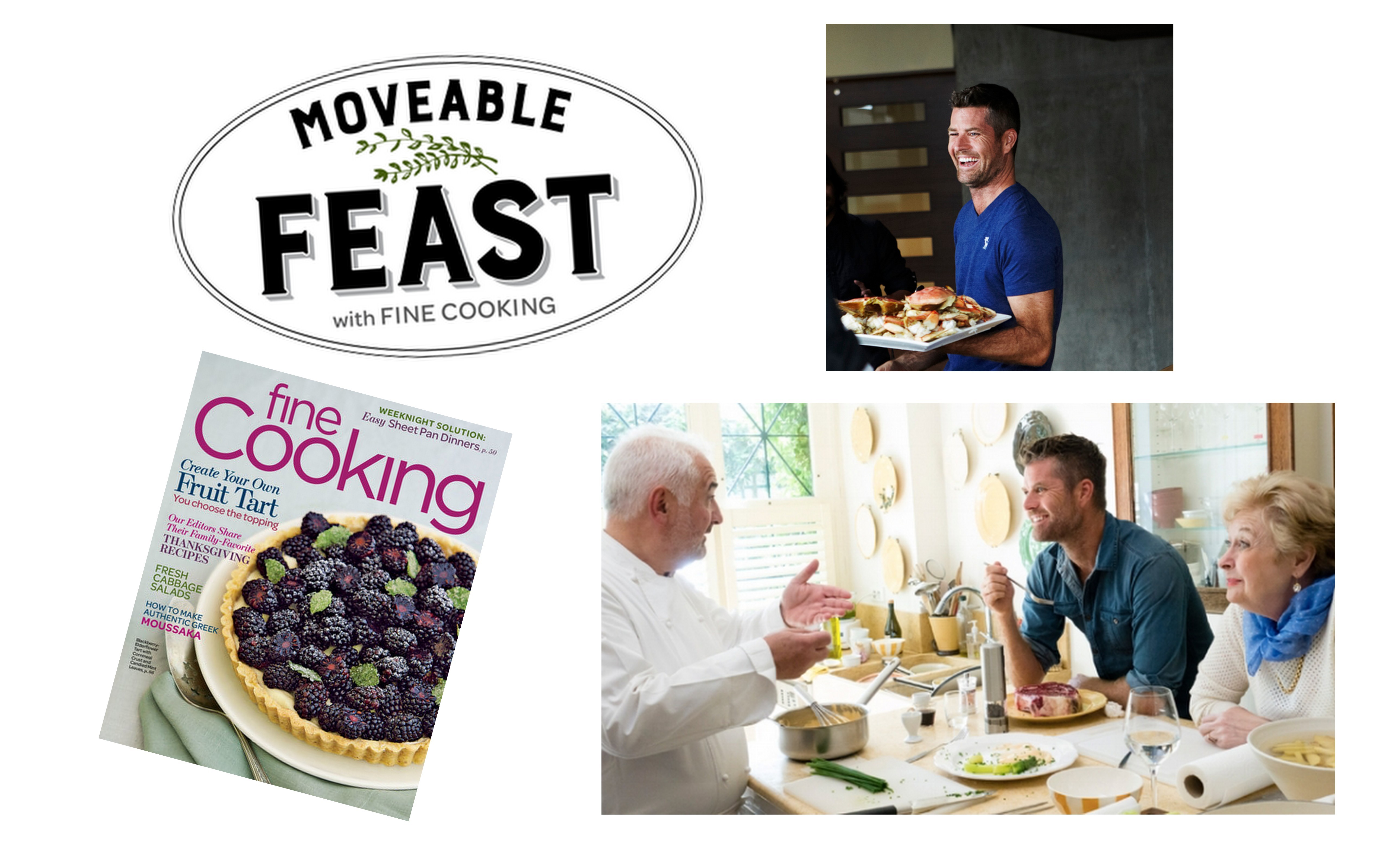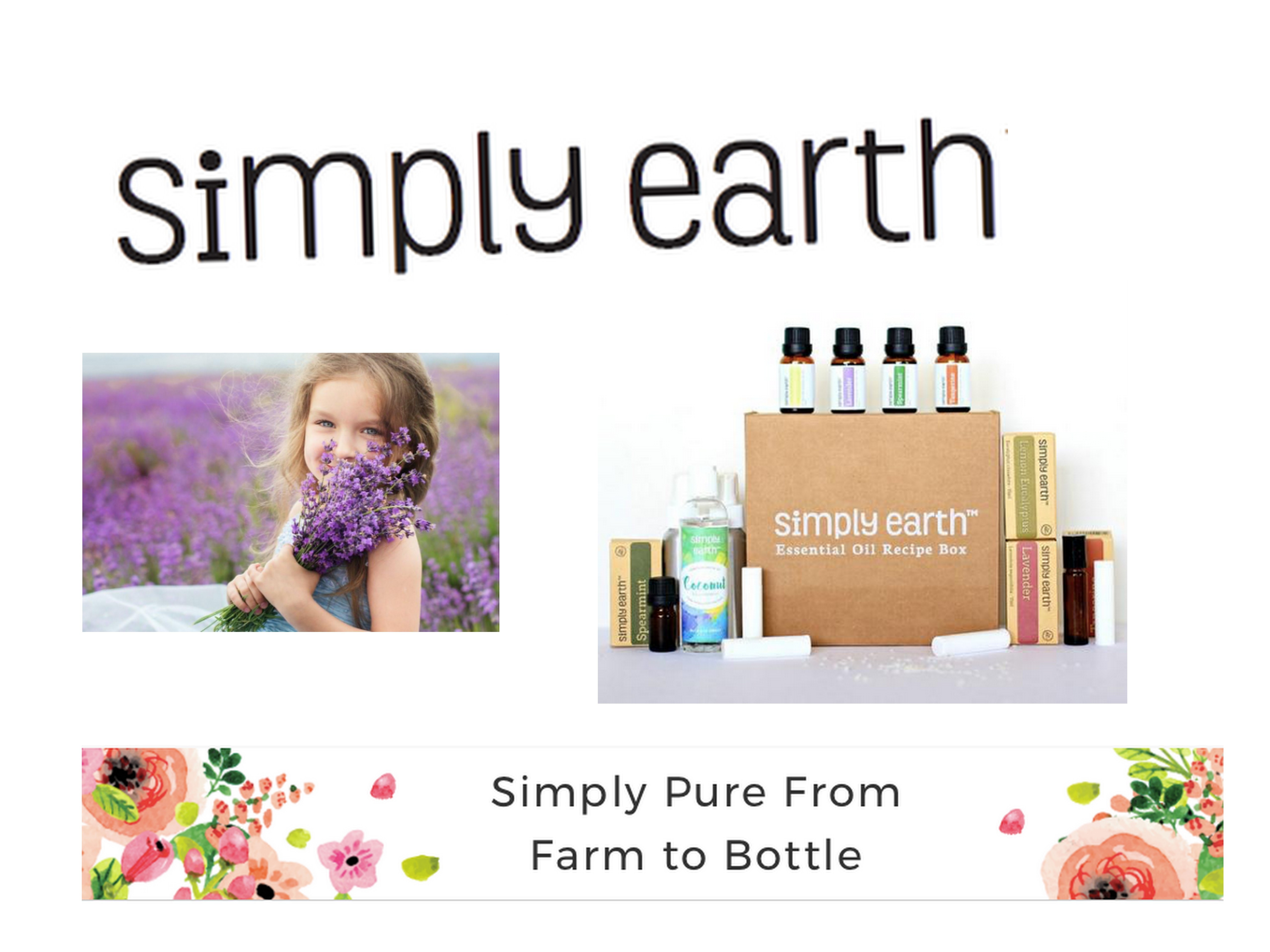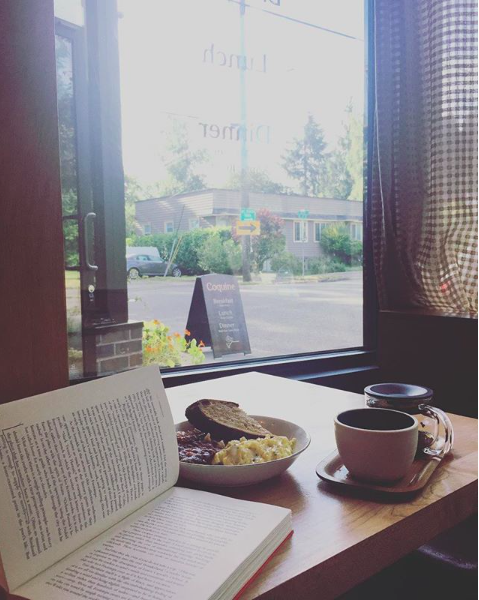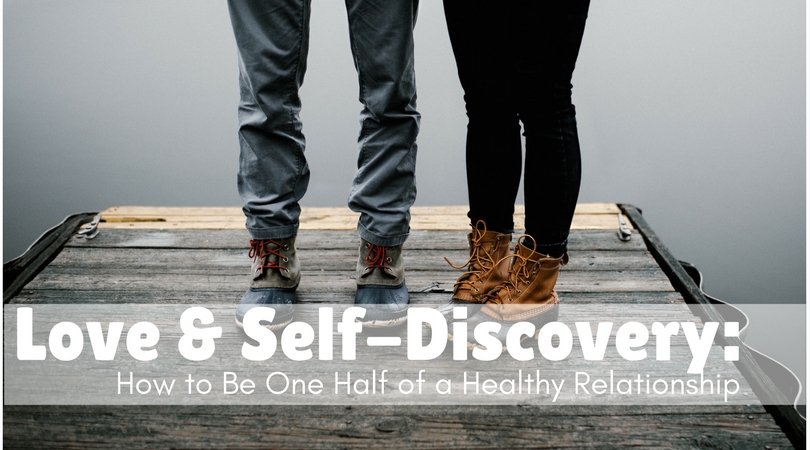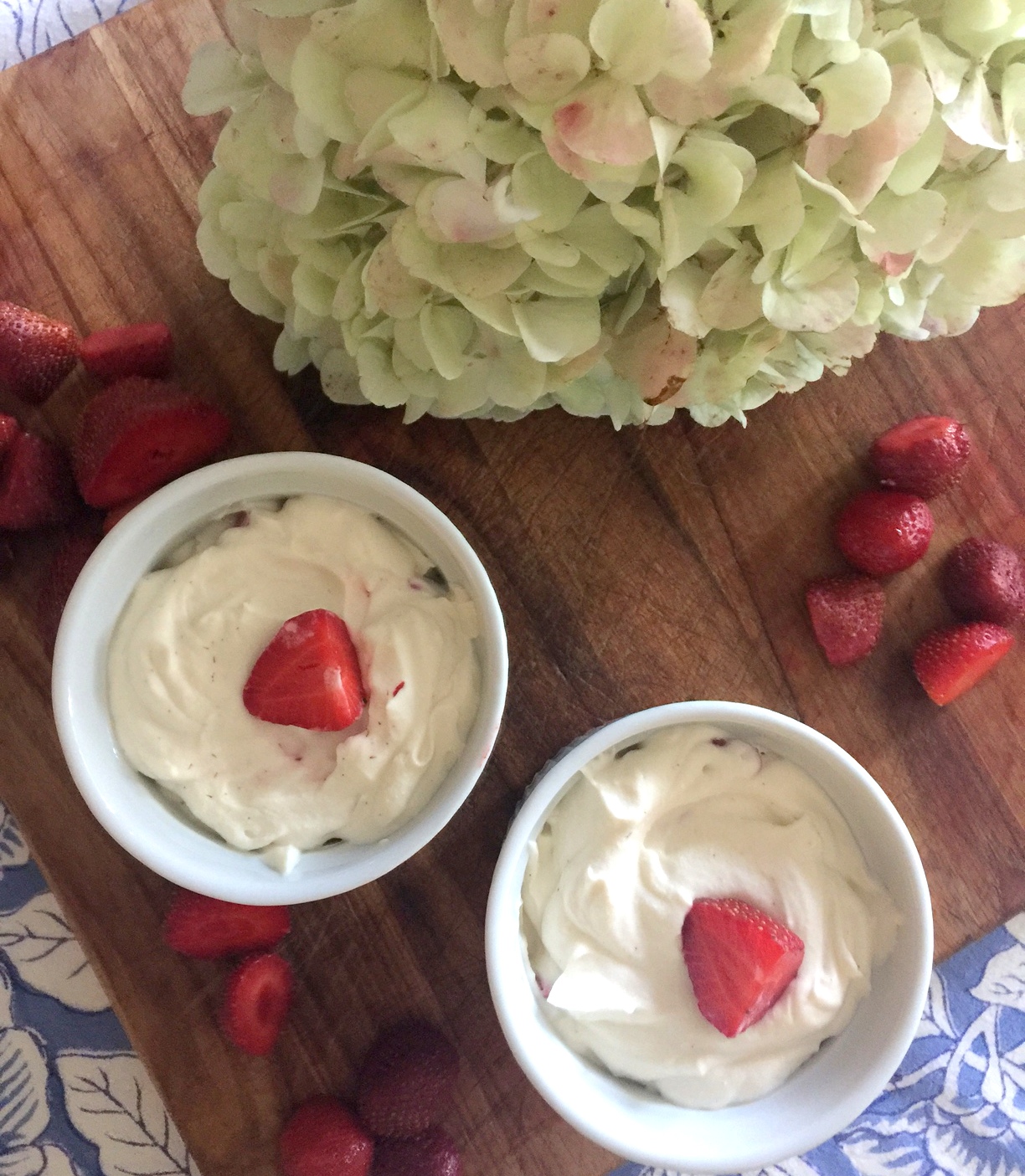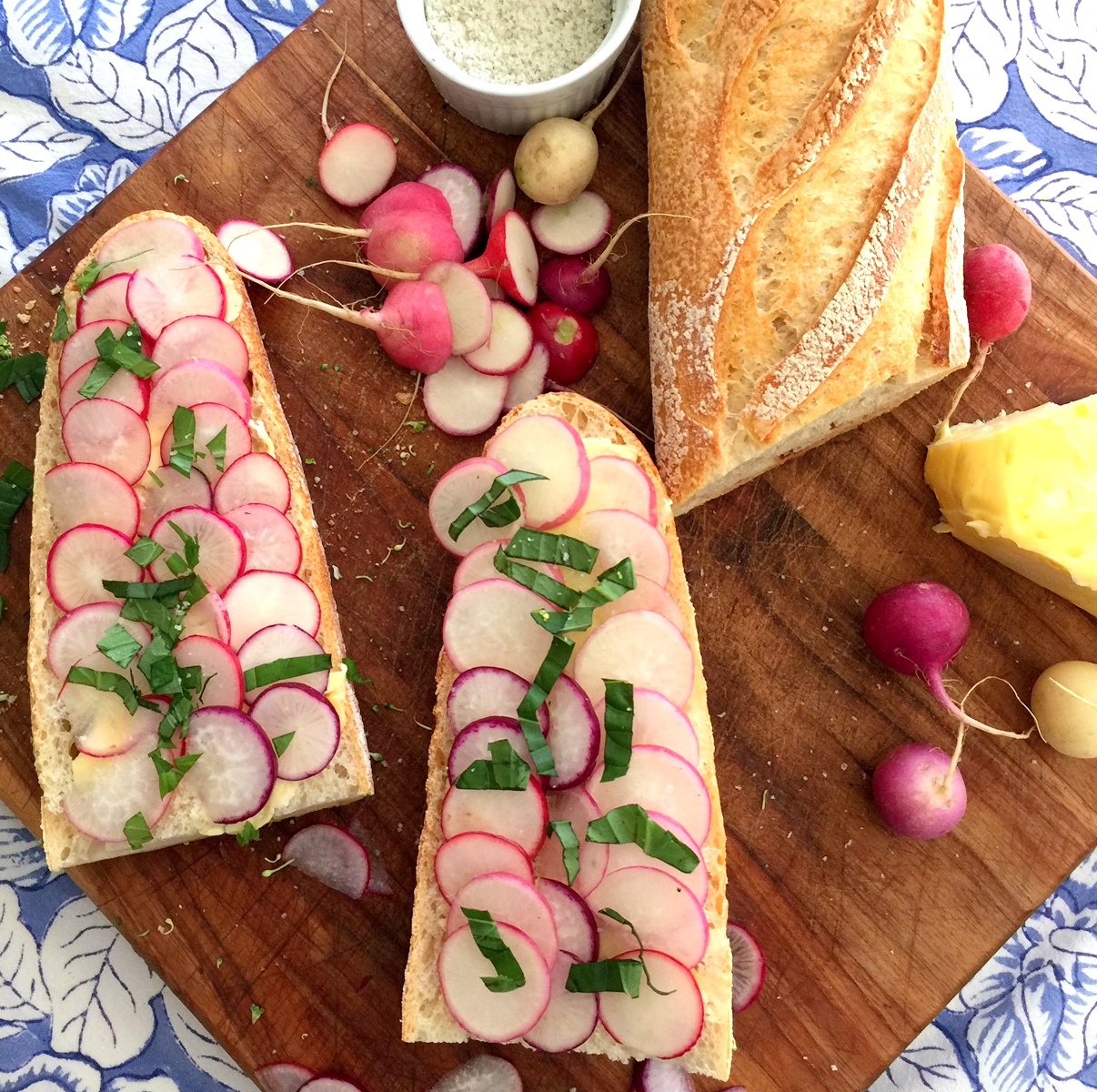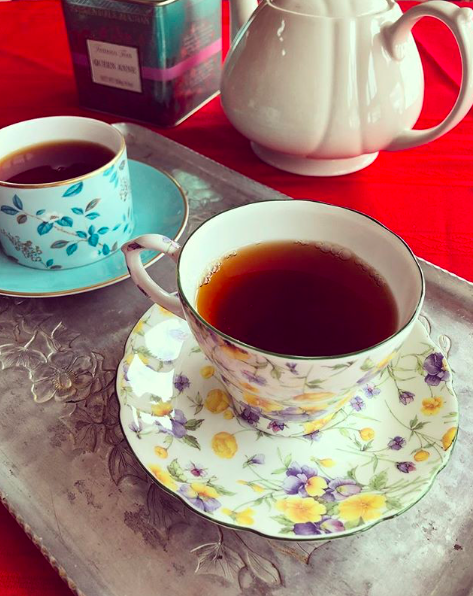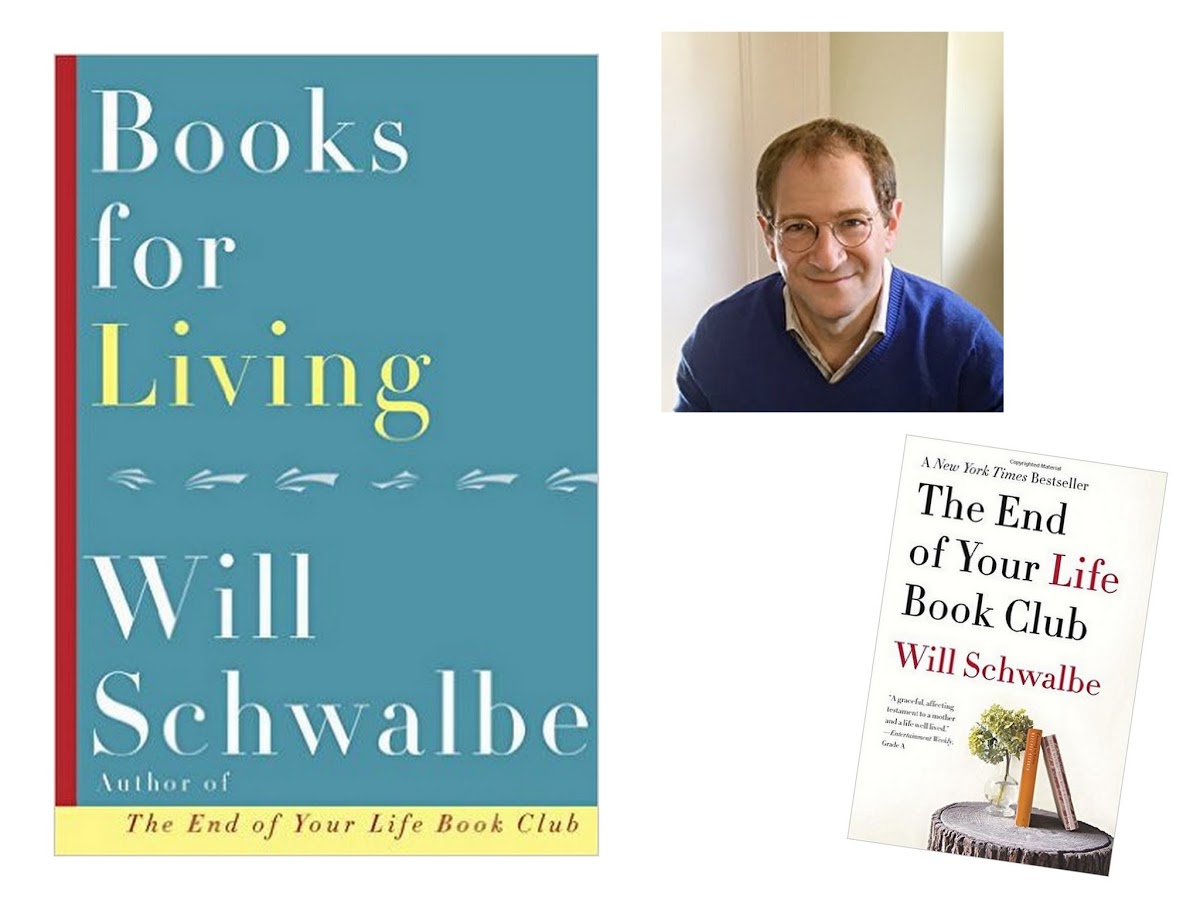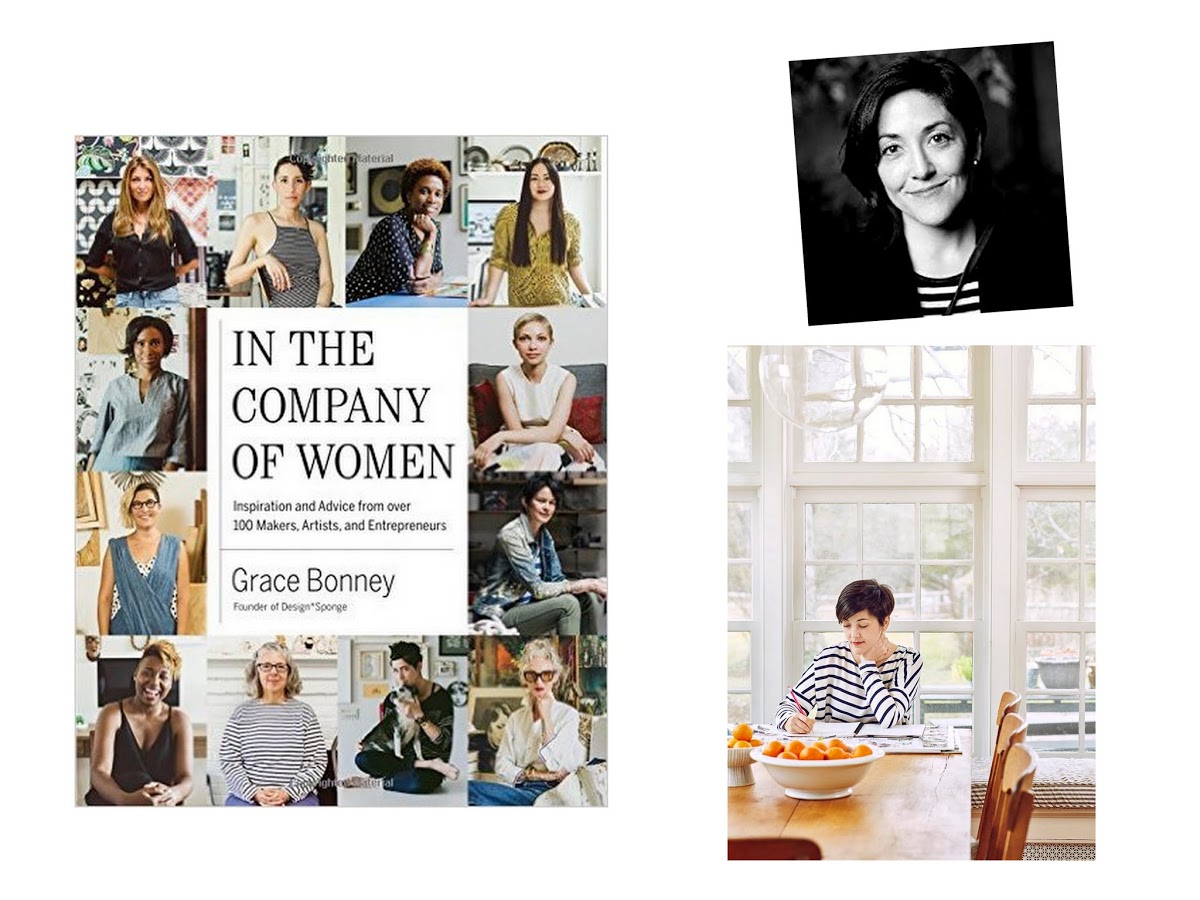Tue, 20 June 2023
"We think love has to be obtained, earned, achieved, and received. We look for it in the form of attention and compliments, and people acknowledging us. But actually the greatest way to experience love is to give it." —Jay Shetty, author of 8 Rules of Love: How to Find it, Keep it, and Let it Go A simple formula to love is to be it and it appears. However, this seems either too simple for some of us or to not produce the 'type of love' we had in mind. Such thinking, to have a narrow definition of what love has to be in our lives to be fulfilled, or to refuse to let go and just be instead of chasing, demanding, swiping or requiring, is to get in our own way when it comes to living a life, every single day, full of love. Because guess what? Such a life is possible, and it is part of what living simply luxuriously is all about. In fact, it is at the core, because as I will share today, it all comes down to finding peace with ourselves, embracing our true selves and engaging fully with the world without expectation. But again, we are being asked to do less, not more, to look inward so that we can engage lovingly outward as well as lovingly toward ourselves. We are being asked to be honest about what makes us feel loved and stop engaging in practices that result in anything but. Visit the Show Notes on the blog The Simply Luxurious Life - https://thesimplyluxuriouslife.com/podcast360 |
Tue, 1 November 2022
"Creating healthy boundaries is how you ensure that you're happy and well in your relationships and in life." —Nedra Glover Tawwab, Set Boundaries, Find Peace: A Guide to Reclaiming Yourself To have boundaries that are respected is to give your life and your days peace of mind. Just as a sovereign state provides the foundation for its citizens to thrive instead of merely surviving due to the absence of worrying if what they need to live well might not be theirs tomorrow, so too do the boundaries we assert, communicate and actively uphold. But as is alluded to, we must engage consciously, intentionally and consistently. Licensed therapist for more than 14 years, Nedra Glover Tawwab wrote a book, a highly successful and praised both by readers and critics book, titled Set Boundaries, Find Peace: A Guide to Reclaiming Yourself, that is exactly what her book provides - a guide. A guide sharing the tools, but also the reasons to motivate readers to welcome boundaries into their daily lives, whether with their friendships, work, children, parents, romantic partnership and even regarding our use of social media and technology. Boundaries, healthy boundaries, as she explains the non-healthy boundaries and why they are destructive and deteriorate the quality of our lives, are an essential piece of our everyday life if we wish to live a life of contentment. And her book is a hands-on step-by-step guide teaching you how and which boundaries you need.
Upon reading this book, I immediately knew I had found a valuable resource, one to not only utilize now for different aspects of my life, but no doubt in the future either when I want to be reminded or discover what I need to do, how to communicate and validate my decisions to honor my needs. As well, just as importantly, is to understand and honor what others needs as well and to not take their boundary setting personally. In today's episode/post I would like to share with you how setting the right boundaries contributes, and exclusively contributes an essential ingredient that elevates the quality of our lives, thereby deepening our true contentment experienced in our everydays. If what is shared today speaks to you, I highly recommend picking up a copy of the book where you will find the specific examples of what to do/say, what not to do/say in very specific, as well as different situations. ~The Simple Sophisticate, episode #343~Subscribe to The Simple Sophisticate: iTunes | Stitcher | iHeartRadio | YouTube | Spotify | Amazon Music |
Sun, 19 December 2021
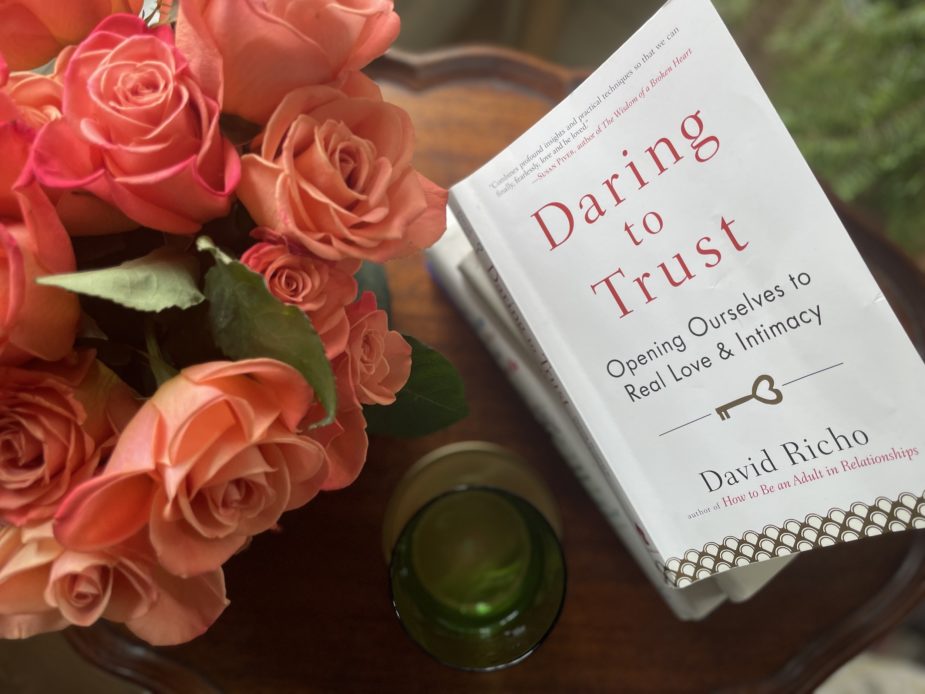 "As we practice unconditional trustworthiness, we notice a healing result: we are no longer devastated when others fail us. Our focus has shifted from ourselves as victims of others' betrayals of fidelity to our own commitment to trustworthiness. We still see that some people are not trustworthy, and we feel sad and injured. But as long as we do not follow suit, we are not so hurt as we once were—and we like ourselves more. This does not mean that we have become naive or gullible. It actually shows that we trust ourselves more. Then we become more discriminating in recognizing trustworthiness in others." —David Richo, author of Daring to Trust: Opening Ourselves to Real Love & Intimacy Often the word trust is expressed as a fundamental desire to find in other people, but what often is forgotten is how we play a role in both being fully trustworthy, but also trusting ourselves. Having self-trust, David Richo shares in his book Daring to Trust is one of the four types of trust we must possess in order to live a deeply enriching and fulfilling life. What are the other three types of trust you may be wondering? We will talk about those in today's post/episode. Over the course of this podcast, I have shared many discoveries from a vast range of books on how to improve the skills that will improve the quality of our lives (see the list of the most recent, the past two years, below). I found it especially poignant and timely that I read Daring to Trust as the year 2021 wound down.
Often we aren't certain or cannot pinpoint what exactly is preventing us from living a life of true contentment. Perhaps we have come quite close, have felt it from time to time, but not consistently. There are moments of deep fulfillment and peace, but it eludes us at other times, and we wonder what we have done wrong. For me, after reading the following books listed above (link to the episode each book inspired), I felt confident I had the ingredients to live a life of everyday contentment, and largely I did, but the said contentment would flit away when certain moments would present themselves, and so I kept searching. I told myself, there must be a missing ingredient I have overlooked. I must have missed a crucial skill for holding myself steadily in contentment each day. Turns out it was understanding what true trust is and how to be fully trustworthy all the while acknowledging that we (and others) are human. Both of these concepts are what will be discussed in today's episode/post. First, let's find common ground on what trust is. David Richo defines it simply as reliance on reliability. He underscores, "[Trust] is not dependency but rather an inner assurance, a confidence that gives us a sense of security." 1. Strengthen your trust IQ: Know when to walk away "We trust others when we feel safe and secure in their presence. Our insistence that we will spend time only with those with whom we feel safe increases our trust IQ. Over time, we become more adept at telling the difference between a con artist and a straight-up guy. When we feel unsafe with someone and still stay with them, we damage our ability to discern trustworthiness in those we will meet in the future." Understanding true trust in others and exercising trustworthiness in how we live our lives gives us the tools to know when to stay and when to leave. Richo's quote above brings to our attention the importance of how we hurt this skill of discernment each time we distrust what we know about trust.
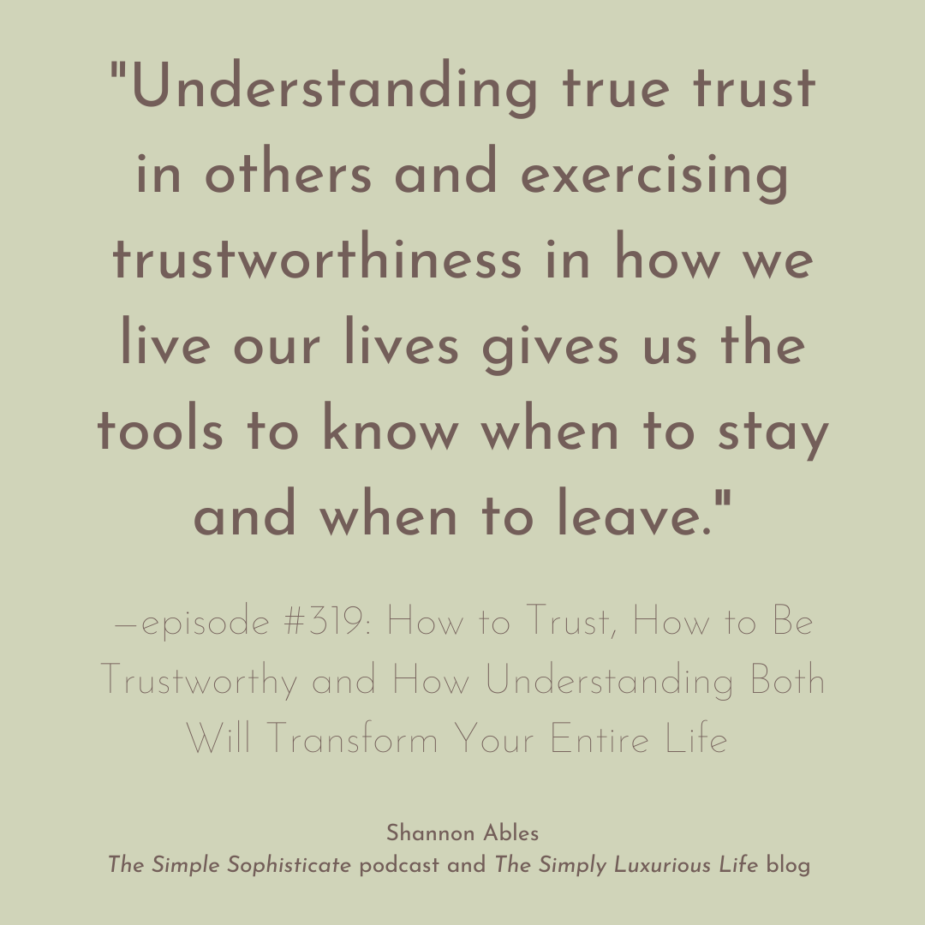 When we know we can trust, "we know longer have to protect ourselves" and the cultivation of true intimacy becomes possible. But first, what is adult trust? In other words, what is the trust we need to understand? 2. What is trust, adult trust? When I read the first chapter of David Richo's book I became immediately aware of how I had approached trust incorrectly throughout my adult life. I had placed the responsibility on the other to show trust or to be trustworthy, placing the power in someone else; however, I had it backwards and I disempowered myself in the process. Let me explain: Adult trust is "I trust myself with whatever you do" instead of "You will never hurt me." Sounds crazy to choose to let go of the latter statement, but again, you are taking back your power, taking responsibility for being trustworthy and being able to accurately determine if someone is available to be trusted. Richo points out that when we make this shift to adult trust, we remove the victim mentality and own our life, our choices and honor ourselves which improves our ability to observe those who are capable of being trusted as we move forward. By putting the trust in ourselves to discern if others are trustworthy, knowing we can walk away at the worst of it, speak up with assertiveness (not aggression) we exhibit security in ourselves. And when we demonstrate we are a secure individual, we attract healthier individuals to us as we are not seen as a burden to someone else, not seen as a victim in need of someone else's care. 3. True trust takes time As much as we desire to flat out trust the person who captures our eye, our libido, our hopes, to say we fully trust someone so quickly is foolhardy. In fact, we must count ourselves fortunate if we grew up in a family home where a healthy installation of trust as Richo calls it was part of our upbringing because we will know what true trust looks and feels like in others as we navigate into our adult lives. However, if such a childhood was not part of our life story, it is important to learn what true trust is so that we will begin to seek out those we can trust and let go of those we cannot. We forget that as a baby, our whole lives were placed in the responsibility and care of adults we didn't get to choose. Over the course of our childhood - 18 years or so - we either have a mountain of evidence that our parents were trustworthy to provide security and care or we don't, but it took time, and our parents were not perfect, so they made mistakes, but most likely, they are people you could trust. The imperfection is important to note, as is the time factor. Trust takes time. No matter how attracted you are to someone, no matter how hotly charged the chemistry that runs between you two, neither have anything to do with whether or not you can trust them. You may want to trust them, but you do not have enough experience with them, time with them or exploration of them to know whether you can or not. What does taking time to trust look like?
"Our companion practice of the unconditional yes to what is directs us to be thankful for trustworthiness from others when it comes our way and be open to disappointment sometimes too." 4. Often sex is desired when it is trust we seek "Regarding touching, it is central to trusting." While there are the five languages of love as Gary Chapman talks about in his book which was the central focus of episode #87 - Romantic Love: What is it and How to Maintain It, touch is often something each of us is starved for. Healthy touch, loving touch, a safe touch. Richo brings to our attention that "in adulthood we may look to sex as a substitute for the touch and holding we need" when what we are actually seeking is a heart connection which can happen in many other ways of touching. However, because we know that other forms of touching prompt great emotional response, we are fearful of the emotion that will arise, so the sex gives us temporarily what we long for, but isn't fulfilling if it isn't with someone we trust. On the trustworthy side, which is something we have entire control over (we'll talk about what that is in the next point), when we trust ourselves (self-trust) we aren't afraid to express our emotions or let ourselves feel the emotions we have while with another, and so we are able to let go of our unnecessary inhibitions and extend touch - whether in an arm around the shoulder, a touch of the hand or a kiss. All of these actions again are exchanged with someone we trust and motivated by sincere exchange of feeling knowing the person with whom we are exchanging feels safe with us. 5. Be wholly trustworthy in your daily actions When we are trustworthy, David Richo explains, we are living with and engaging with the world with integrity and loving kindness.
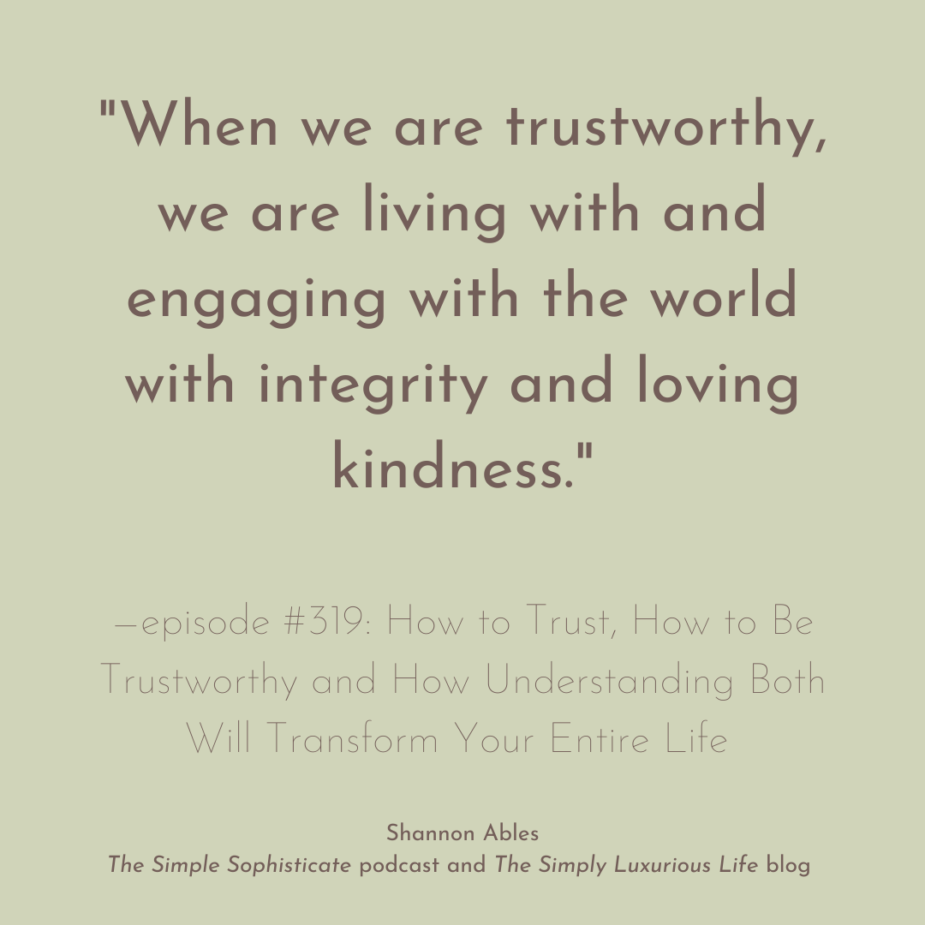 When we act with integrity, we may be rejected, we may even be laughed at, but because we are mature enough to understand how trust can be built with another, the opinions of those who reject or laugh or scoff matter less because we have strengthened our inner resources and know to walk away. We do not take revenge, retaliate or act in a way that is against our integrity, but instead engage with loving kindness. Richo shares this detailed list of the many ways you express loving kindness and integrity. Here is just a taste:
6. Build a full and healthy life: Rely on your partner for only 25% of your needs fulfillment It is not just a romantic partner we shouldn't rely on for more than 25% of our needs fulfillment but any one person. Why? If we remain in the child-parent trust model which is a survival approach, we are in a dependency-relationship which thwarts any attempt for a healthy, fulfilling relationship. Ironically, we are programmed to have our survival needs met - the child-parent model - but we must shift away from this comfort seeking and step into the challenge approach to living which requires that we become more comfortable with the unknown and cultivate more self-trust (we'll talk about this type of trust below). The shift occurs when we start seeking safety and security from within rather than outside of ourselves. When we make this shift, our world changes for the better. Our days and relationships more enriching and our contentment grounding. Richo shares a quote from Henry David Thoreau which I found quite succinct and accurate to describe what we seek in relationships, "I will come to you, my friend, when I no longer need you. Then you will find a palace, not an almshouse." So where does the rest of our need fulfillment come from if only 25% can come from any one person? It comes from the healthy social circle and self-care you have thoughtfully nurtured over time, and that doesn't just mean people. In this post, I share a list of different connections and relationships worth investing in and then in this post share the elements of a strong social well-being. Simply put, your friends, family, yes, even your pets, and of course your career, spiritual practice, Mother Nature and any other resource that strengthens your sense of safety and security make up the remaining 75% of your needs fulfillment. 7. Exercise, as well as be able to identify, the five A's In episode #287 - 5 Things to Do to Build Healthy Relationships, David Richo's first book How to Be An Adult in Relationships: The 5 Keys to Mindful Loving inspired the content. Detailing the five A's necessary to be exercised by both individuals in any mutually satisfying and fulfilling relationships, these 5 A's play a fundamental part in building trust. What are the A's?
We are being trustworthy when we express each of these in relationships. We know someone is worthy of being trusted when they exercise them in return. (read this post to explore each of the A's in more detail). 8. When we have self-trust, there is no need, or desire, to control others "The yes of surrender to the limits in our relationship leads to serenity, the safety and security that happen from within us. Such surrender is our proof to ourselves that we really can trust ourselves. We begin to redirect our trust, an empowering venture." An intimate relationship takes time to build as both involved have taken the time to show they are trustworthy. When we trust the other, we gradually and then more largely surrender, and surrendering is possible because we hold fast and steadily to strong trust of ourselves. The surrendering has as much to do with being with another human being as it has to do with letting our feelings be what they will be in the midst of all the experiences that will arise. And letting ourselves fully feel these feelings without suppression. I speak largely of the awesome feelings that we may have thought were never possible. We are more comfortable with surrender because we trust ourselves to respond rather than react, to speak up with assertiveness not aggression when our needs are not being met as well as knowing what our needs are and why because we have done the homework of ourselves as well as acknowledged that we are still growing and learning and evolving. Richo writes about men in American culture and how often when men deny or step away from the potential of a relationship with a real, healthy and secure individual, stating the reason is because they fear losing their freedom, it is actually an inaccurate reason. Let me explain. If the person they are stepping towards is indeed real, secure and has self-trust, then what men actually fear is not the loss of their freedom, but rather the feelings that may arise when they surrender themselves to what the relationship, what the intimacy, may actually be and who they will become when they surrender to the truth of what they feel. In other words, two self-trusting adults who exchange all of the 5 A's create a space, a life of fulfillment without controlling the other. Why? Because we are not forcing the other to be engaged with us. They want to be with us because we each find comfort, affirmation, love and community with each other. It feels good because it is good to feel our best, and if we feel our best with them, even when we unintentionally make mistakes or life trips us up, so long as we are acting with integrity and loving kindness, the intimacy remains and actually strengthens. Such strength in a relationship takes time to build, just as trust does and that is why true intimacy, true fulfillment, true love, takes time and is never at first sight. 9. Strengthen your core trust and become curious about your own life journey Essentially our core trust is acceptance in the reality of the world. A letting go, a trusting in magic and truth of things beyond our control. It doesn't mean we do not engage or act passively, but we do not strangle life. We let it unfold while dancing with it. When we exercise our core trust we "generate a calm abiding, a serenity that energizes. The opposite of being in control is resting secure and being alert to what comes next." "To open to reality is to turn toward it and to trust that it makes room for us in that very same moment . . . all this happens as we let go of control and stay with whatever happens until it transforms." Understanding what core trust is and how it can open up our lives was an aha moment for me. In many ways over the past 12 years I have been exercising a core trust even though I was doing so unconsciously. When we take our life experiences and mine them for wisdom rather than wallow in them and lament about how things may have been different, we are choosing to embrace our journey and figure out what is our calling, how can we marry what we are passionate about with what the world needs - our dharma as Jay Shetty calls it and in so doing, our journey unfolds in ways we could never have imagined. We are open to possibility and brave enough to explore the unknown while staying grounded in our self-trust - our boundaries maintained, our values held once questioned and evaluated to truly be our own. "When I give up trying to direct the show and instead keep opening to how it unfolds, I unfold." Richo reminds that "without core trust, we can't relax our grasp and let reality unfold as it needs to . . . with core trust, we gain confidence that nothing can happen to us that does not offer a fulfillment of our ineradicable yearning for wholeness. Thus everything in our lives, whether from events or from people, is just what is needed for our unique story to be told." How exciting is that! How freeing is that to know that it is in the letting go, engaging, but not demanding or manipulating, that we actually infuse our life with awesome possibility. 10. As your trust strengthens, your wisdom grows "Wisdom requires us to open to what happens and be discriminating about what we let in." As we come to understand what constitutes trust in someone else, as we explore our own feelings to accurately access what our needs are and why we are feeling what we are feeling, as we communicate with assertiveness paired with courtesy our needs, as we experience the walking away and opening up to new people, as our self-trust grows, as our core trust grows, we are better able to know who to begin letting into our lives and who to walk past. 11. Understand where the need to control originates "Our need to control is actually not a need; it is a panic that our needs will not be met unless we take full charge." Richo's explanation of the truth he states above prompted many lightbulb moments to go off in my own head. I found myself shaking my head in agreement, acknowledging the truth of my own desire to control in a variety of different instances in my life, and I felt grateful to finally have found his insights as they helped me better understand myself. The truth is, when we demand to control, we let go of the core trust we must have in order to live a life of fulfillment. The ego wins when we require something go exactly our way, and when the ego wins, we are relinquishing the belief in our own powers. We are far more capable than we acknowledge in such moments, and letting the ego win keeps us in a state of dependency rather than trust in the world around us and in ourselves. 12. The four directions we give our trust In today's episode so far we have talked about self-trust (#8) and core trust (#9), and now I would like to talk about the other two because once we have all four types of trust being exercised in our lives, the quality of our relationships and our experience of life, thus a life of fulfillment, elevates. When we exercise self-trust we become better able to determine who is trustworthy and who to continue to get to know in a variety of types of relationships. Exercising self-trust in this way ushers in the third type of trust - interpersonal trust.
As we nurture a variety of interpersonal relationships of trust, we make sure not to place more than 25% of our needs in any one relationship. We do so because we trust ourselves, we have a core trust and, to introduce the fourth type of trust, we have trust in a higher power. Do not jump to conclusions. A "higher power" as defined by Richo "can mean belief in a personal God or in any force or spirit in nature or the universe that transcends ego and can be relied upon for grace and support. In many ways, our core trust and trust in a higher power are one. Richo is not saying our destiny has already been pre-ordained or even that there is intervention by something we don't understand. No. What he is saying is that we can have "confidence that no power on earth can hold us captive to hate or prohibit us from loving." This does not require us to have faith in a literal God, but rather to understand something we cannot fully understand but have the courage to believe in the 'friendliness of the universe'. Richo goes on to talk about Grace-full Coincidence in his epilogue, further encouragement to each of us to let go, act with integrity and loving kindness in each of our days, be engaged with the world, but not demanding, and trust in something magical. He poses this question: Does the universe position things so carefully that our hearts can open at just the right time? What mysterious power makes it all come together just like that? Is it that friendly? How can we ever doubt that we can dare to trust? My immediate response and annotation in my book was, I hope so. And so I am consciously daring to trust, to open my heart to that possibility and take control of what I can, which is only myself and how I engage. Remembering to exercise the 5 A's, remove the stories from my mind and walk with patience and self-trust along with all of the other trusts, grateful for the gift of being here on this earth. I dare you to do the same and am confident your life journey will delight and amaze you when you do.
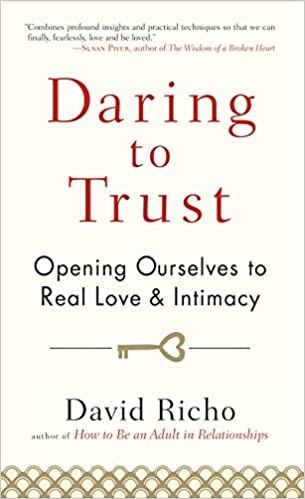 Explore the full book here.
Petit Plaisir —John Coltrane's Giant Steps album
~The Simple Sophisticate, episode #319~Subscribe to The Simple Sophisticate: iTunes | Stitcher | iHeartRadio | YouTube | Spotify | Amazon Music |
Sun, 5 December 2021
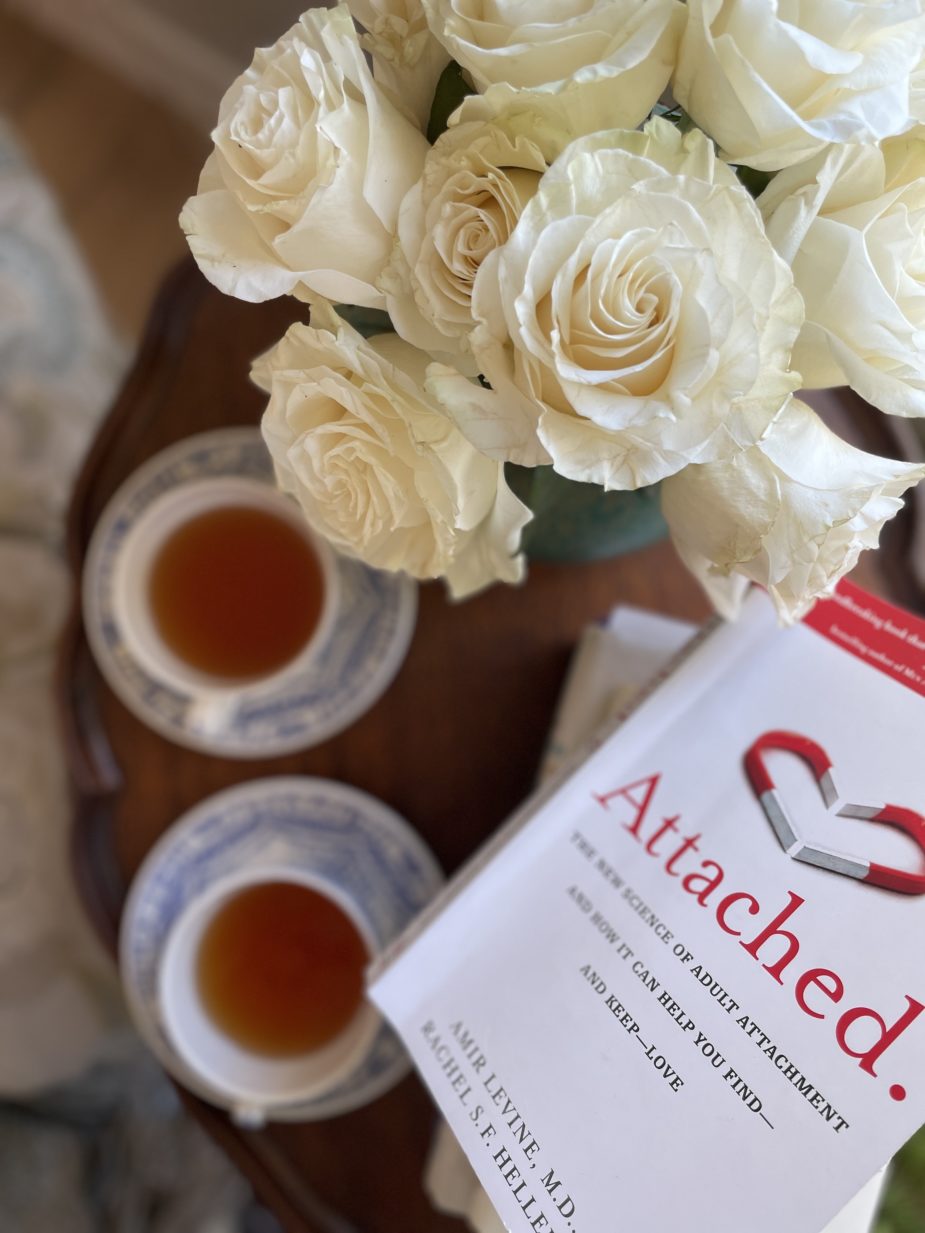 "If we feel secure, the world is at our feet. We can take risks, be creative, and pursue our dreams." —Amir Levine, M.D. and Rachel S.F. Heller, M.A., authors of Attached: The New Science of Adult Attachment and How It Can Help You Find—and Keep—Love Until we know the priceless gift of peace security in relationships of any type bring into our everydays, it can seem unfathomable to trust such peace is possible. On the flip-side, if all that we have ever known due to the good fortunate of our upbringing with secure, loving parents and community is a life and way of being that enables us to try, explore, and soar, then it isn't until we meet someone or try to engage with someone who is insecure that we realize the awesomeness of being secure in a relationship. During the height of the pandemic lockdowns, a book that was published in 2010 hit record sales as those in relationships sought advice on how to strengthen their relationships, those desiring a relationship inquired how to be and find and build a secure relationship and wherever else readers may have fallen on the continuum of wondering about relationships picked up the book Attached.: The new sequence of adult attachment and how it can help you find—and keep—love by Dr. Amir Levin and Rachel S.F. Heller. Without the tools or knowledge to understand what feeling and behaving in a secure way might be, we do our best to navigate the emotions that naturally arise when we take the risk of meeting someone knew and intertwining two different people's lives into one, yet hoping to ensure contentment for both. However, if we don't know ourselves well, don't know how to communicate clearly, yet kindly and without harm, and our partner doesn't either know themselves well or doesn't communicate effectively, how are we know what works for the two individuals involved? The good news for all of us is that having a Secure attachment style can be learned. We are not born with or without it. We are taught or modeled different attachment styles during childhood and then through adulthood; the key is to be aware and knowledgeable of each, and to acquire and practice the skills of being Secure. And as for seeking out a partner, become a secure adult enables to understand what is shown from those we consider entering into a relationship with so that we choose wisely and engage in a healthy manner to put the odds in our favor of finding and keeping a healthy, loving relationship. "Time and again, research shows that the best predictor of happiness in a relationship is a secure attachment style."
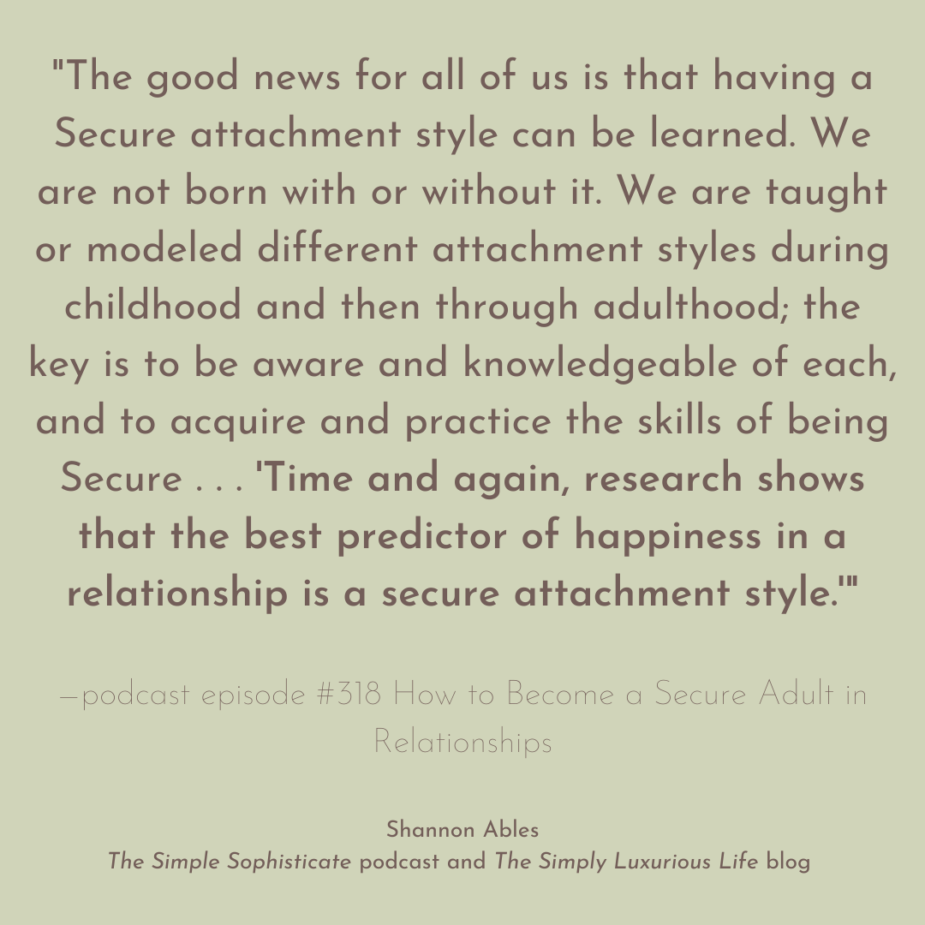 Benefits of being a secure individual in life and in relationships:
What are the characteristics of a secure individual? First, it is important to note that you cannot determine simply by looking at someone that they are secure. Simply because someone is friendly, likable and sociable does not mean they are secure. The author adamantly refutes the belief that a secure individual can be determined by their "charm, composure and/or self-confidence. As with other attachment styles, personality or physical traits won't give secures away. Secure people fit almost every description across the personality spectrum." But back to the question: what are the characteristics of a secure individual? "(1) They are programmed to expect their partners to be loving and responsive and (2) don't worry much about losing their partner's love. (3) They feel extremely comfortable with intimacy and closeness and (4) have an uncanny ability to communicate their needs and (5) respond to their partners' needs." I picked up the book early this fall after reading an article in The New York Times by Foster Kamer. While I had heard of the three, technically four different types of attachment styles, I had never deeply explored them to fully understand them. Of course, being, feeling and engaging with Secure attachment styles sounded to me to be a no-brainer, but I knew I didn't always fall into that category . . . and I wanted to. For the sake of my own well-being, but also for all relationships I was part of, especially an intimate, romantic relationship, I chose to pick up the book and become a student. Guessing how to be Secure didn't seem to me to be a recipe for success, so I chose to be a student, purchased the book, and have since read it three times, re-reading certain sections based on what I needed to more fully understand. Once I read the book I knew I wanted to bring it to listeners of the podcast and readers of TSLL blog, so today, I will be sharing 13 skills and insights for becoming a Secure adult in relationships. By no means is what I share with you today the full breadth and depth of what the book details, so I highly recommend, if this topic interests you, to pick up the book. Let's get started. ~Note to Readers: Be sure to tune in to the audio version as each point listed below is discussed in detail, content that is not included in the written post. 1. Understand the Dependency Paradox"Does [being programmed to connect with someone special] mean that in order to be happy in a relationship we need to be joined with our partner at the hip or give up other aspects of our life such as our careers or friends? Paradoxically, the opposite is true! It turns out that the ability to step into the world on our own often stems from the knowledge that there is someone beside us who we can count on—this is the "dependency paradox". (p. 29) "If you want to take the road to independence and happiness, find the right person to depend on and travel down it with that person. Once you understand this, you've grasped the essence of attachment theory." 2. Understand your current attachment style (it can change, it is not permanent)"Attachment styles are stable but plastic. Knowing your specific attachment profile will help you understand yourself better and guide you in your interactions with others. Ideally this will result in more happiness in your relationships." Know thyself. A common refrain here on TSLL blog and podcast, but the truth is you need to know where you are now in order to acquire the correct instructions to arrive at your desired destination. 3. Learn how to effectively communicate your needs - be clear and kind"[Secure individuals] are able to sensitively and empathetically—and most importantly, coherently—discuss their emotions". Speaking at someone is different than speaking with someone, and how we speak with someone will determine the potential for our needs to be heard. To speak with kindness is to be inoffensive and to "not put your partner on the spot". Use "I feel" statements or "I need" statements to express why you wish to share what you are sharing. The practice of effective communication stretches across all types of relationships and it is never too early or too late to start. Often our goal in communicating is to gain what we desire, but the truth is, we may not immediately gain what we desire, but we will at least become clear about who can or cannot be what we need or give us what we need. Of course, immediate actions from our partner, friend, child or boss doesn't mean they cannot or won't be able to as sometimes it takes time to process, to work on logistics, etc., but if you don't effectively and kindly communicate your needs, no one will know them. "Effective communication is the quickest, most direct way to determine whether your prospective partner will be able to meet your needs." 4. Don't play games5. Refrain from engaging in the 'relationship dance'Defined as 'one partner getting closer while the other steps back in order to maintain a certain distance in the relationship at all times', with a secure partner you don't step too closely too quickly, simply at a steady and reasonable pace that the two people involved feel comfortable moving. There is no rushing as there is a groundedness in one's self and a secure person is "comfortable with closeness" and isn't afraid to step forward once they know themselves and who they are stepping toward or someone they want to get to know better. This is not to say a secure person knows it will work out, but rather they have a sense of steady assurance in themselves and that what they give is real and worth exploring. ~Post to explore: 10 Ways to Strengthen Your Self-Worth 6. View "sex and emotional intimacy as one"Distance is created when the two are separated. Again, such a view speaks to the ability to be comfortable with closeness once both partners have been vulnerable beyond the bedroom as they get to know each other and are drawn to each other beyond the physical chemistry. 7. Responsive and expect it in return (remember, no games)Having communicated their needs and listening sincerely to their partner's needs, the reciprocity of responsiveness rather than dismissal strengthens the trust and intimate connection. 8. Be availablePhysically and emotionally being present for your partner is the action of a secure individual. When we communicate our needs and tend to them as well as observe our partner is responsive to our needs, we in turn are also showing up and making ourselves available. 9. Support without interference"Provide behind-the-scenes-support for [your partner's] endeavors." Allowing your partner to pursue what they are passionate about, helping without over-taking or taking the credit so that their gifts shine is the support of a secure individual. As a secure individual you are helping because you want to support your partner, yet are securely tending to your own passions and need no spotlight, need not be in control, rather only present to help as needed without being recognized by anyone other than your partner. 10. Understand there are many potential partners11. Don't feel a need to act defensively or punishIn other words, secure individuals can see a situation more objectively. They can effectively diffuse the conflict, observe in their partner what really provoked their outburst or anger, and not add fuel to the fire. 12. More likely to step into a healthy relationshipWe must keep in mind that a secure individual tends to be savvy in their partner selection. It doesn't mean if you are secure, you will always select a secure partner, but through clear and effective communication as the getting to know you phase unfolds, you can observe red flags early-on and find the right partner more easily. I didn't say quickly, but being secure does help you not step forward too far with someone who would not be the right person. 13. Expects to be treated with respect, dignity and loveDovetailing with #12, a secure person begins any relationship with effectively communicating their needs which is why knowing yourself highly benefits the ability to choose a partner to begin to get to know. The fundamental foundation piece for a healthy relationship is believing, yes, knowing, you are worthy of respect because you extend it in your everyday life. When you present yourself to a potential partner holding yourself in a space of self-respect, knowing you deserve to be treated with dignity and love, then you can quickly discern to whom to begin engaging with and whom to walk away from. Of course, even as this book points out, research findings change with hindsight, time and more examination, and it is never wise to take an entire book at face-value but rather to read with a critical mind and discerning objectivity. However, what I am confident you will find is that no matter what your relationship status when you apply the tools and skills explored and taught in this book, you will find a deeper peace and inner calm that you may not have had prior to including them in your life. After all, at the core of the definition of contentment is to find a peace within no matter what is swirling about outside of you. How we choose to engage, what we step forward toward and refrain from engaging in determines the quality of our lives, and if we apply the knowledge we have about ourselves and what we desire to cultivate in our everydays which absolutely, relationships play a significant role, we begin to realize the amazing gift we give ourselves when we become a secure adult.
Petit Plaisir —Winter Flower Bouquet with Ornamental Cabbages Click on the link above to learn more about how to arrange your own bouquet - so simple and quite inexpensive (under $20).
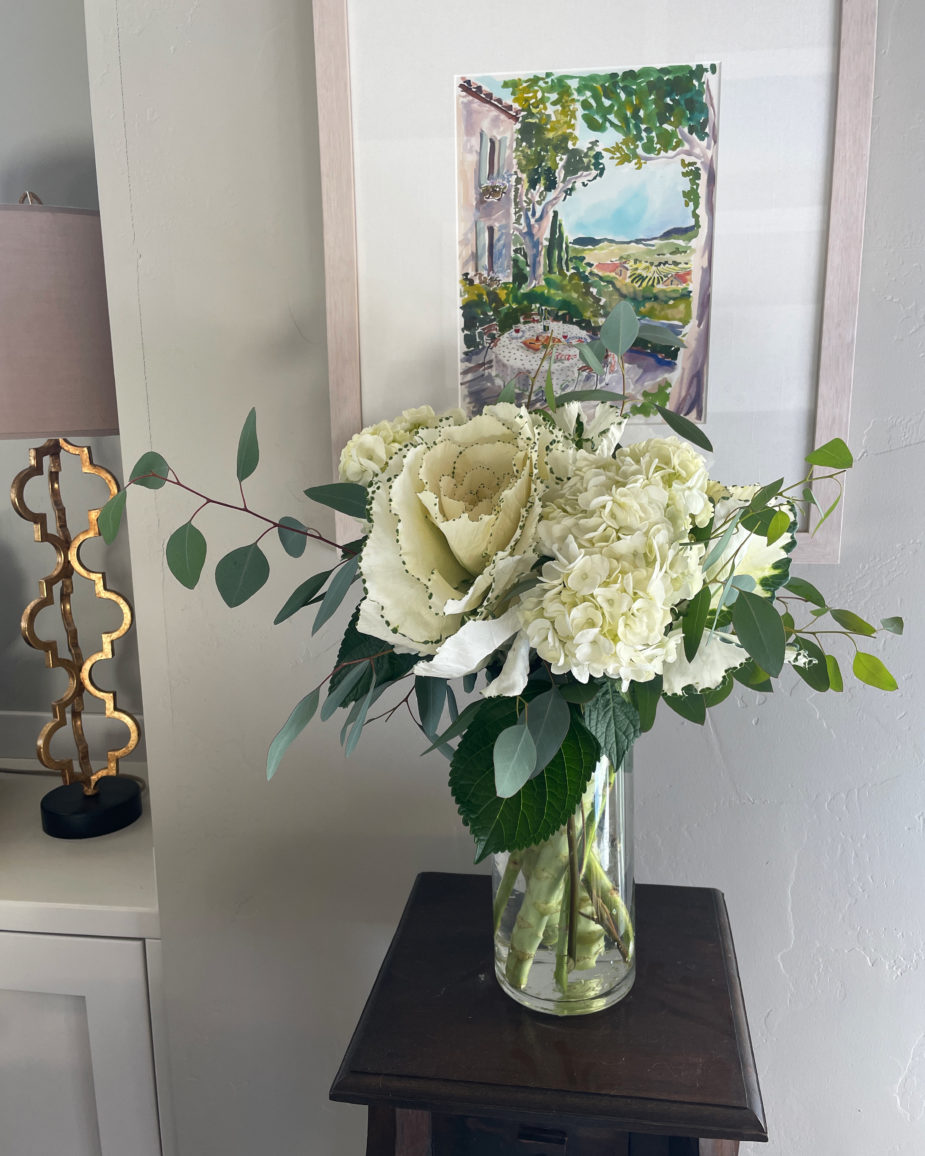
SIMILAR POSTS YOU MIGHT ENJOY
 5 Things to Do to Build Healthy Relationships, episode #287
~The Simple Sophisticate, episode #318~Subscribe to The Simple Sophisticate: iTunes | Stitcher | iHeartRadio | YouTube | Spotify | Amazon Music |
Sun, 31 October 2021
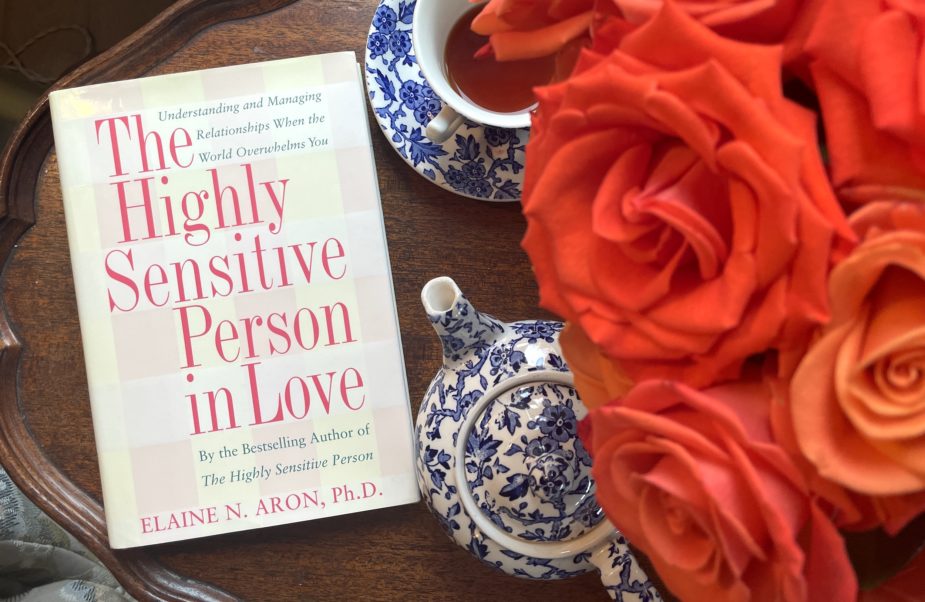 "We fall in love harder and fear it more because we are drawn to the depth and complexity of the emotions we are going to unleash, but we also know that the consequences of such deep love are unforeseeable, a situation we never relish."—Elaine Aron, author of The Highly Sensitive Person in Love: Understanding and Managing Relationships When the World Overwhelms You Being in a loving relationship, of the romantic persuasion, can seem evanescent or near impossible for HSPs (a Highly Sensitive Person). In episode #44 of this podcast (one of the most downloaded episodes of the show), I detail the many gifts of being an HSP (of which I self-identify). Sharing 26 awesome benefits of identifying as HSP after reading Dr. Elaine Aron's first book The Highly Sensitive Person: How to Thrive When the World Overwhelms You ushered in a breath of not only fresh air, but relief as I felt that finally I understood what for my entire life existed, but I could not understand or explain, let alone receive understanding from others who just didn't 'get me'. Enter into the world of trying to be one part of a healthy, loving, respectful, equally fulfilling romantic relationship, and my confusion did not dissipate however because even though I tried my best to communicate what I now better understood about myself, I was missing a better understanding of how to first meet people more likely to mesh well with me. I was looking in the wrong places, misreading the indicators of my own feelings I had relied on my default in my pre-HSP-aware years. Introduced to Elaine Aron's second book The Highly Sensitive Person in Love, I found a valuable resource that translated the once foreign language of my own self and feelings and also gave me tools to successfully and more confidently move forward. In today's episode I am going to share 10 aha moments I found while reading the book, but there are FAR more than 10. Consider this a taste of what you will find in the book which is now a highly annotated book in my library and one I am thankful to be able to return to as my life journey unfolds. 1.Your partner does not need to be HSP as well (but it helps if they fall somewhere in the middle of the spectrum of sensitivity) With 15-20 percent of humans "born with a nervous system genetically designed to be more sensitive to subtleties, more prone to deep reflection on inner experience and therefore inevitably more easily overwhelmed by outer events", it can at first seem (if you identify as HSP), that you are alone, different, odd and something must be wrong with you. First, let me state emphatically - nothing is wrong with you. As shared above in the introduction, you have awesome gifts and now that you know you are HSP you can begin tapping into them. It is also important to know there is a spectrum of HSP, and Aron provides a HSP Self-Test to help you find where you and your partner might fall on it as a way to provide further insight into ourselves and our partner. As well, it is important to know, one gender does not have a tendency to be more likely HSP or not HSP. "Just as many men as women are born highly sensitive, even though women are stereotyped as being sensitive to subtitles and men being tough and not noticing much." Not only is the stereotyping wrong and limiting, it is hurtful, yes to women, but especially to men as they are essentially bullied into hiding their true gifts if they are HSP. Aron begins her book by talking about her own marriage with her husband who is not HSP; however, he has many sensitivities and awareness and appreciation for the world around him that enabled them to have many shared experiences which they both enjoyed. As you will find in the following points, a desire to understand one another and for each partner to be able to communicate and know who they are is key as well as desiring to be part of the partnership in a constructive way without losing one's core needs to thrive. 2. One of the biggest overlooked areas in relationship 'self-help' is the dismissal of one's degree of sensitivity and inherited temperament Aron does temper the truth that for far too long relationship problems dismissed the awareness of each individual's degree of sensitivity and inherited temperament by saying that "relationship problems are still social, not genetic". She goes on to say, "The heritability of divorce only means that something about people's genetics is influencing divorce—I believe it's not our inherited temperaments that are causing trouble, but that we deal with some temperaments poorly." Something we've distinguished in the past, but bears repeating - temperament is something you are born with, your personality is nurtured as you are socially conditioned - what is applauded, what is teased, etc.. And while we may not feel we can change our temperament, we first need to be aware of what it actually is, and often our personality is such a strong façade we have presented for so long, it is hard to know what our true temperament is. With all of that said, Aron underscores that "50 percent of your risk of divorcing has something to do with your genes. This makes inherited temperament a very important and neglected fact in relationship harmony." 3. Understanding your optimal level of arousal is crucial "All organisms like an optimal level of arousal, and all day we humans make adjustments to stay there—we put on the radio to increase arousal, take a nap to decrease it, call a friend to increase it, turn off the TV to decrease it, and so forth. We do this over longer intervals too—change jobs to increase it, avoid divorce to decrease it, travel overseas to increase it, move to the country to decrease it." Whether or not we identify as HSP, as Aron states in the quote above, each of us throughout our days and our lives are trying to maintain the optimal arousal level. What must be understood about HSPs is that "we get overaroused a little sooner than others" and that is perfectly fine, even if others may try to make you feel as though something is wrong and you should push through and just deal with it - discomfort or not. Don't buy into their ignorance or dismissal because it's more than discomfort, it is disrespecting your true nature and if you chronically dismiss what you need, your relationships suffer because you cannot be fully yourself or at peace. 4. Understand the culture you live in and what it values, and then don't be bullied to change "HSPs growing up in cultures in which they are not respected have to be affected by this lack of respect." Looking at the same study which took place in China and Canada "comparing elementary school children [it was] found that sensitive, quiet children in China were among the most respected by their peers, and in Canada they were among the least respected." Aron shares insightful examples of how even science and its findings are influenced by what the culture values (see p. 32 in her book). I share this insight of Aron's to help HSPs become aware of the media, culture, voices and leaders that surround them and to listen and examine what you hear, see and witness being praised with a critical mind. If the predominant behavior in men that is applauded is loud, dismissive, unfeeling, more men will gravitate toward such behavior (unconsciously or consciously, likely the former) because of social acceptance. The same for women, if the behavior is to be the harried mother who just deals with it and is applauded for being exhausted, but still she is put up on a pedestal for burning the candle at both ends, instead of fighting the culture (they are exhausted after all), they go along because at least they are being praised. Those are two general, and in some ways extreme examples, but all of it is to say, if we become aware first of our own true temperament and then of the culture that surrounds us, we can then live in alignment to our true selves and if the culture we live in doesn't applaud our natural tendencies to find peace, we can find our own peace and those who no doubt also exist in our culture and simply wish to find strength in others who understand. 5. Establishing good boundaries is essential First, reflect upon your own life at the moment. If you feel overworked, are constantly saying yes, but as Aron describes "resent it later", you are likely not setting good boundaries. You may even occasionally put down boundaries, but they are severe and shut out everything and everyone. Again, these are not good boundaries, even if they are boundaries. Another important truth to know about the harm of not establishing good boundaries is when we haven't put them in place we allow others to tell us hurtful false truths about ourselves - "you are weak, nonassertive, insensitive, rigid, etc.". ~Explore this post and episode on boundaries and relationships: episode #126: A Powerful Couple: Boundaries & Vulnerability 6. You can "fall in love" and not even be in a relationship with the person I have put 'fall in love' in quotes because, "research shows that the longer you contemplate an object in an emotional way, the more intense the emotions toward that object will become". I will just admit, in my early twenties I held on to a hope for someone that while maybe it kept me out of some not-great relationships, it also kept me out of living and being present with others. All of this is to say, we need to simply spend time with the person, take our time getting to know them but also being ourselves around them and not over-processing what is revealed, but rather let it unfold as it will. Why? Because when we expend more emotion and 'more processing' we fall in love more intensely, and sometimes we fall too quickly. 7. Know where to meet a fellow HSP and How to Meet Non-HSPs Well As an HSP, you likely enjoy your own company and find peace in hours of solitary activities. Knowing this also tells you that you will need to go out alone in order to have conversations with other HSPs. Aron suggests going where fellow HSPs might go (if it's somewhere you'd enjoy going as well). From seminars, lectures, art exhibits, heading out into nature, etc.. As I mentioned in #1, being in a healthy, loving relationship as an HSP doesn't mean you have to be with a fellow HSP, but you do need to know how to hold yourself in a respectful way so both in the relationship are understood. If you are amongst a group of non-HSPs, Aron suggests moving out of the group in some way, and find a way to talk in a more one-on-one manner. Listen and ask questions but remember to bring your emphatic dialogue skills which is what we will talk about in #8. 8. Practice Empathetic Listening and Emphatic Dialogue Studies have shown that when one person in a relationship holds the majority of the power and influence - what they want to do, what they believe is the default - neither partner is happy long term. And while it may seem emotionally easier to just go along with what your partner wants to keep the relationship steady, calm and void of upheaval or disagreement, it is actually the best thing you can do to speak "plainly, honestly, without blaming . . . but without flinching, your authentic truth". Thus the definition of Emphatic Dialogue. Empathetic Listening involves more than just paying attention to the words that are being spoken. "The listener attends to the feelings as well as the content and does not interrupt, interpret, advise or even offer his or her own experience or ask questions." I am putting this definition in bold because so often, we heard the advice - which comes from a good place - to simply listen. But we aren't often told or shown how to do so well. I find Aron's definition to be incredibly clear and something I still practice as I make mistakes, but awareness of how to listen well is the key, and with practice we become more proficient and thus better partners in a healthy relationship.
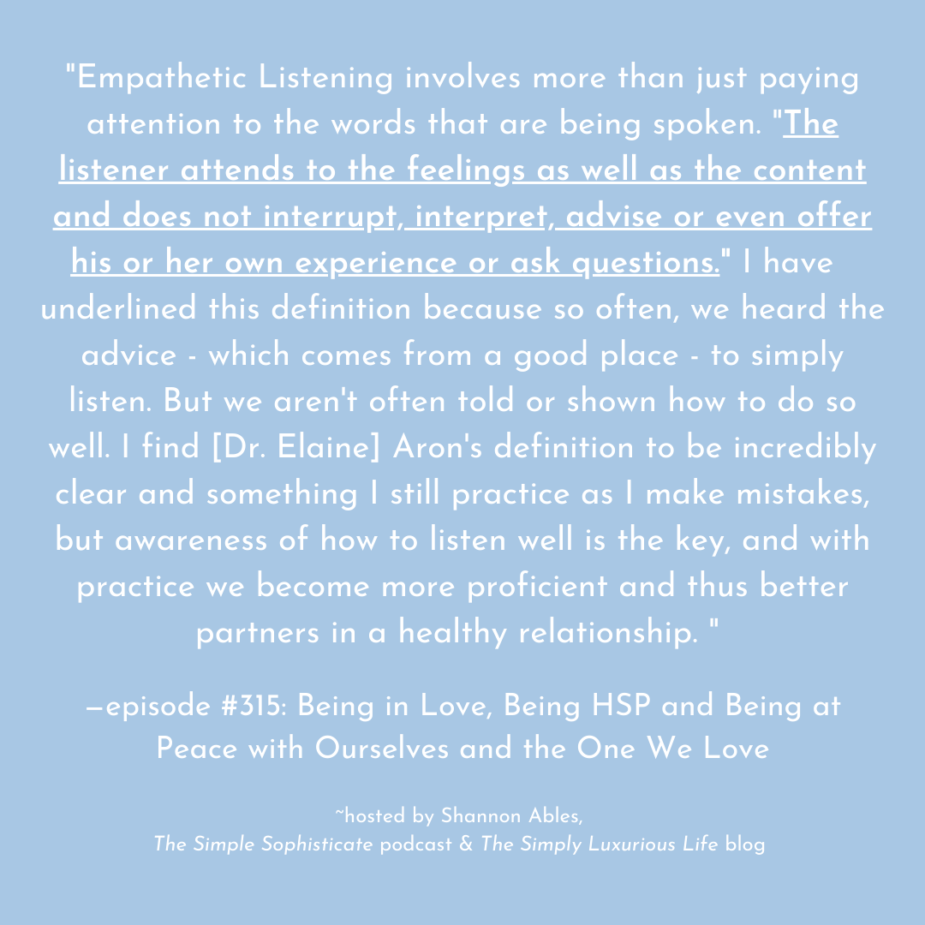 9. Refrain from jumping to the wrong conclusions (i.e don't make blanket assumptions) "Both self-love and other-love increases when we don't make too many personality attributions about ourselves and others, when we recognize that people cannot be completely explained with a label such as shy, rude or even highly sensitive, and that situations are complex, rich, often unpredictable and infinitely interesting." In #4 we talked about how a culture will favor one temperament over another. If you live in a culture that values the temperament you do not align with and you have not had a support system to strengthen your confidence in your awesomeness that you are, you may have a low self-esteem (which can be strengthened, but awareness as to why is helpful to reverse the lack). Because of our low self-esteem or negative past experiences in relationships, when a person we are interested in, perhaps have gone on a date or two, hasn't called back, we can jump to negative assumptions - about them and about ourselves. Don't go there. Instead, do the following: Self-reflect and be honest with yourself about your own reactions. Aron suggests that maybe you actually are not as interested as you think you should be, but you are trying to make it be something it is not. In other words, take a breath, practice patience and go on about your life. If you wanted to call them, do so. Be your true self, express your interest, but keep your healthy boundaries. This will take practice, there will be rejection, by them but also by you, but there will also be peace because you have honored who you are, communicated your feelings and strengthened your muscle of mastering your overarousal. 10. How to prevent overarousal During times of conflict, overarousal can often occur if we are not aware of the signs we are nearing such a state. Again, self-awareness is key. It is also important to note that when we reach a state of overarousal, especially in a situation of conflict, any contribution we attempt or any new information shared is not being processed, which means all engagement is pretty much wasted energy. All of this is to say, knowing how to prevent being overaroused is important. First, if you have spoken out of a state of overarousal - name called, etc. - Aron states, with the support of research, "83 percent of marriages last if the partners show [the] repair skill" of "saying right away 'I shouldn't have said that—I'm sorry'." Apologizing is not a weakness. In fact, it can strengthen relationships and build trust if the same mistake is not made again and again. Aron lists more than a few specific tools to avoid overarousal, and they begin with self-awareness. Are you stressed already? Are you tired? Once you know yourself, how you are feeling in a particular moment due to other circumstances - work, previous conversations, the news, etc. - you can best decide if you should enter into a conversation that you know will increase your arousal and whether you have the strength at that moment to remain in a helpful state of conversation and engagement. In a healthy relationship, compromise does occur, BUT it is important to hold yourself in your awareness here most especially. "Look for every place where you can compromise or give in without feeling you have violated your own needs". And one of the most important approaches, and without it can actually cause more stress on an HSP, is to "agree about when you will resume your discussion and don't put it off too long". 11. Take a breath and take time "HSPs in particular need time to decide about others—you need time, and if the other is an HSP, that person does too. You need time together and you need time between to think it over . . . if you persist, love may grow, or it may die. But time is on your side, in that the more you know each other, the more it will be that whatever happens will be for the best." The willingness to let the relationship evolve naturally, at a pace both are comfortable with can be hard in that sometimes we don't realize we are rushing due to cultural pressure or pulling back out of unexamined fear from past hurts or confusion about our feelings. Again, this is where self-awareness and a confidence in exploring our feelings and then expressing them calmly, yet with strength as to clarify healthy boundaries, moves the relationship forward if both parties continue to be interested. We learn about each other as we spend time together in shared experiences and when we force desired experiences, we sometimes lose the potential of what could be. This is not to say, if we don't force and if we are patient that the relationship will work out as we had hoped. We cannot know how it will turn out, but being ourselves, taking the relationship at the pace it goes while partaking (not sitting back and letting the other person call the shots or not call them and thus letting it dwindle away) is the only way to know what the next right step is. 12. The truth of loving is especially hard for HSPs, love anyway "HSPs especially tend not to want anything to change or die, so this message is important: In long-term relationships you must be ready to endure the nice-friendship aspect of your relationships being betrayed, perhaps through a terrible fight, in order for the passion of the Self, through essential spirit, to be reborn." I wanted to share this last, additional point. Part of the reason I know I have avoid relationships in the past is because it hurts so incredibly much when that person is no longer in my life. Whether in a romantic relationships or friendships and family, our beloved pets. However, part of the reason it hurts is because we loved deeply, and as HSPs, we really do love incredibly deeply. The tools I did not have however in those past relationships are shared in Elaine Aron's book, and I am gradually and consciously trying to use them to build better relationships with more awareness which ultimately deepens my appreciation, holds me in the present moment and reduces the the chance of any regret when the end of the relationship occurs whether by separation or death. I hope today's episode has shared insights you too can use in your own life to strengthen the love you experience and bring ease as you better come to understand and celebrate your self and the gifts of being HSP.
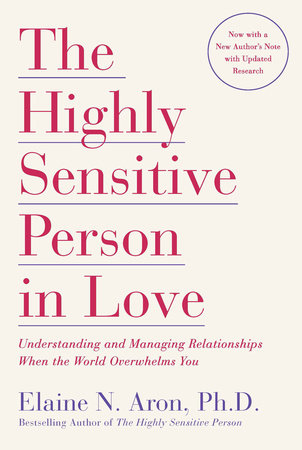 The Highly Sensitive Person in Love by Dr. Elaine N. Aron published in 2001
SIMILAR POSTS/EPISODES YOU MIGHT ENJOY:
 26 Gifts of Being a Highly Sensitive Person (HSP), episode #44
 A Powerful Couple: Boundaries & Vulnerability, episode #126
Petit Plaisir —The Gardener (2018), documentary ~learn more about why I chose the film here and watch the trailer.
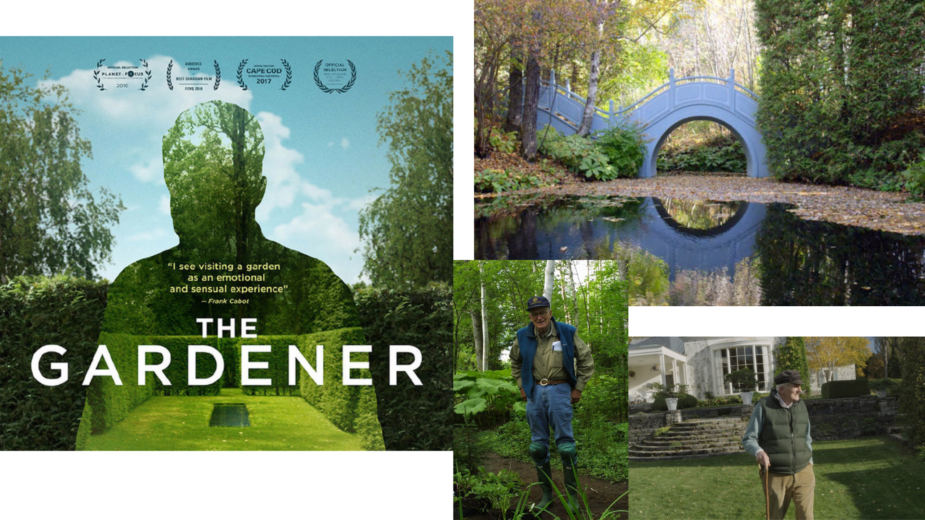 View all TSLL Petit Plaisirs here. ~The Simple Sophisticate, episode #315~Subscribe to The Simple Sophisticate: iTunes | Stitcher | iHeartRadio | YouTube | Spotify | Amazon Music |
Sun, 13 September 2020
As soon as I read the first line in chapter one shown above, the analogy made crystal clear sense of my ignorance about relationships and how to navigate past it: I needed to learn HOW to love, not just want to love and want to be loved. Love, as the oft mentioned quote reminds is a verb, but even if we accept this truth, we have to learn how to exercise this action, and we have to be willing to let go of so much incorrect and unhelpful advice in order to find the peace and contentment we seek. Today's episode can help in all relationships you are engaged in. Fundamentally, the book was written in 2002 for readers trying to improve their romantic relationships, but indirectly, the skills and concepts shared will foster healthy relationships platonically from close friends and family members to acquaintances, neighbors and strangers we bump into along our travels and life journey. Recommended by my counselor, my copy of David Richo's book is annotated in detail, and I have referred back and reread different sections since my first reading. I have chosen to work with a counselor since nearly four years ago, but it did take time to find the right one. Meeting regularly, primarily for preventative and skill strengthening purposes in areas I wish to improve, the opportunity to meet with a professional, trained in the area of expertise we do not have is helpful to make sense of what we learn not only about ourselves but how our minds and emotions work. With all of that said, as soon as I read the book, lightbulbs went off repeatedly in my mind. Ahas occurred frequently and I found an ease I had never felt before regarding my approach to interacting with others in a variety of different relationship scenarios. While I highly recommend you pick up your own copy and read it closely, I wanted to share with you the primary component that underlies everything about being an adult in life and love. The world we live in would rather have us feel insecure and lacking, even though it blatantly argues the contrary (when you purchase their product, create [enter lifestyle and accoutrements] for all to see and witness, or behave in a certain way), so it is no wonder we are confused about what we should or shouldn't be doing when it comes to relationships. And even if we eventually do figure it out, trying to understand what it is that worked if we don't know ourselves leaves us struggling to explain to others why it works if they inquire, don't understand or have not been introduced to the fundamentals shared below. The good news is, this intangible unknown need not be unknown any more. Knowledge is key, and this practice is essential to cultivate habits that will heal you and then strengthen your ability to connect as an adult with adults to build a life of social harmony and contentment. First, we need to let go of some unhelpful and often destructive habits.
Visit the full Show Notes on The Simply Luxurious Life — thesimplyluxuriouslife.com/podcast297 |
Sun, 20 October 2019
 "A true love story isn't a fairy tale. It takes vulnerability and effort." Contentment versus misery. Peace versus malcontentment. Joy versus heartache. What separates a life of the former from the life of the latter in each of these side-by-sides is knowing when to leave life up to chance and when to choose to invest purposely, intentionally and regularly. To successfully reach the result we desire, as with any process, there is a particular order in which certain ingredients must be welcomed into the recipe. Just as with making an awakening cup of espresso, not only do the beans need to be of high quality, but the proper tools must be at-hand and the knowledge of how to use them properly understood. Equally important, the water used that filters through the ground beans must be of high quality, and then, after the necessary process has been tended to, then, the results we wished to see and experience with our own eyes and tastebuds will materialize and savored. Understanding relationships, from the one we will have our entire lives - the one with ourselves, to the relationships we have with others, either platonic or romantic, and how healthy relationships work, and what they require of each of us is life-changing knowledge to possess.
The "Before" "There are no directions. There are no checklists. There’s no “to do” when it comes to love, there’s only “to feel” and feeling cannot be predetermined, it cannot be forced. It arises when we move from our heads into our hearts, stay present, and let go; when we drop our typical millennial, achievement-driven style and instead, remember, the only thing truly in our control is our ability to surrender." —Dr. Jordana Jacobs, in a recent article for We Are Doré I recently received a question from a TSLL reader in her mid-to-late twenties, and I appreciated her candid and sincere question about relationships in which she inquired about how to not be envious of those already in relationships when she is not in one and would like to be. The question inquired about my approach most specifically as she had previously shared she appreciated the celebration and contentment I express of being single (for readers who may not know, I am 40) and enjoying my life. I have shared my response below.
I want to thank the TSLL reader who reached out with her question (I will keep her name private as this was a DM conversation) because I know she is not alone in her quandary. As good timing would have it, after reading this article regarding how currently the culture is approaching dating incorrectly, I found myself nodding in agreement profusely. What I have realized upon reflection as to part of the reason my twenties were unnecessarily exhausting was the energy expended on doing what I thought I "had to do". In this case, the idea that I was supposed to be dating or seeing or getting close to finding my life partner. My experience was less about being inspired by other couples and more a response of not wanting to feel like an outsider. However, it was in my thirties that I finally, as I shared in my books, fully invested my time (outside of my daily teaching job) into getting to know myself and invest in opportunities that my curiosities led me toward. More contentment had and has never been before experienced, and in my case, it all happened without a partner and solely due to my investment in the relationshp I have with myself. Our life's journey, as much as we would like them to be made clear, especially regarding our relationships with others, but vitally as important as the relationship we have with ourselves and where this knowledge will lead, cannot be made known before the opportunities cross our path. When said opportunities cross our path, whether they hint where our passion could lead us or a person who we could not have described until we met them and spent time with them, if we are in tune with themselves, so thereby grounded, but also open to the unknown, that is when our lives begin to blossom. ~Related Posts/Episodes You Might Enjoy:
The "During" "Successful long-term relationships are created through small words, small gestures, and small acts. A lifetime of love is created every single day you are together." —Dr. John Gottman and Dr. Julie Schwartz Gottman, co-authors of Eight Dates: Essential Conversations for a Lifetime of Love As much as our lives depends upon chance when it comes to relationships (with ourselves or with others), once chance has introduced us to the career that speaks our language in a way to offer the vehicle to express our talents and passions with the world or to the person who we mesh with more than we ever thought would be humanly possible, this is where chance steps aside (after all, it has put forth an immense amount of effort) and choice steps forward. Even though the adage "If you do what you love, you'll never work a day in your life" has been stated as fact quite frequently, the fact of the matter is, the idea of "work" must be put into context. If "work" is seen as a having a negative connotation, then perhaps the quote is true as you are doing something you love doing, but if we look at "work" through its benign, literal definition, it involves effort, dedication, diligence and regular maintenance to ensure the career we so love having the opportunity to be a part of our lives keeps humming forward successfully. When it comes to the latter interpretation of work, the same must be said, according to the co-authors, husband and wife, Dr. John Gottman and Julie Schwartz Gottman, of the new book Eight Dates: Essential Conversations for a Lifetime of Love , for loving, healthy romantic relationships as well. Too often, when a couple or a desired career path fails beyond the initial success or wedding day, it is because the choice and chance were flipped. In other words, the idea that technology and endless "dating" as a "to do" item in our planners would suggest we cannot leave our love lives to chance. But as scary as it might sound, if we wish to find a partner that sees us for who we are, respects us for what we do and desires to get to know us because of this truth, we must strengthen our relationshp with ourselves first and thus fall in love with our lives with or without a partner. In doing so, we are leaving our "finding" of a partner largely up to chance. It doesn't mean we don't put ourselves out there, but it does mean putting our phones and all of the seemingly amazingly helpful apps down. Further, once chance has led us, no matter how long it has taken, to what we patiently hoped we would one day discover, we must then regularly make the choice to continue to invest. Both with our emotional vulnerability and our time. If we want our relationship to grow, deepen, strengthen and endure whether it be our relationship with ourselves or with another, we must choose to put the energy forward of our time, our priority and our courage of belief in what seemingly magically introduced itself into our lives and we bravely recognized it to be something that aligned with ourselves. ~Related Posts/Episodes You Might Enjoy:
At this moment, each of us are at a different point along our journeys whether in our career, or I would argue calling or the pursuit of our calling as well along the journey regarding relationships. Once we recognize where we are, we can discover the clarity of understanding how to proceed. With the right balance of being open to chance and embracing the responsiblity of choosing to invest, the discovery of unexpectedly awesome abundance and contentment will dance into and throughout our everyday lives. Petit Plaisir: ~Trader Joe's Sea Salt & Turbinado Sugar and Dark Chocolate Covered Almonds ~A big thank you to TSLL reader Sarah for finding a recipe to make your own: click here.
~Sponsor of Today's Episode:
~via affiliate links, some commissions are earned by TSLL. View Full Disclosures at the bottom of this page. |
Sun, 2 December 2018
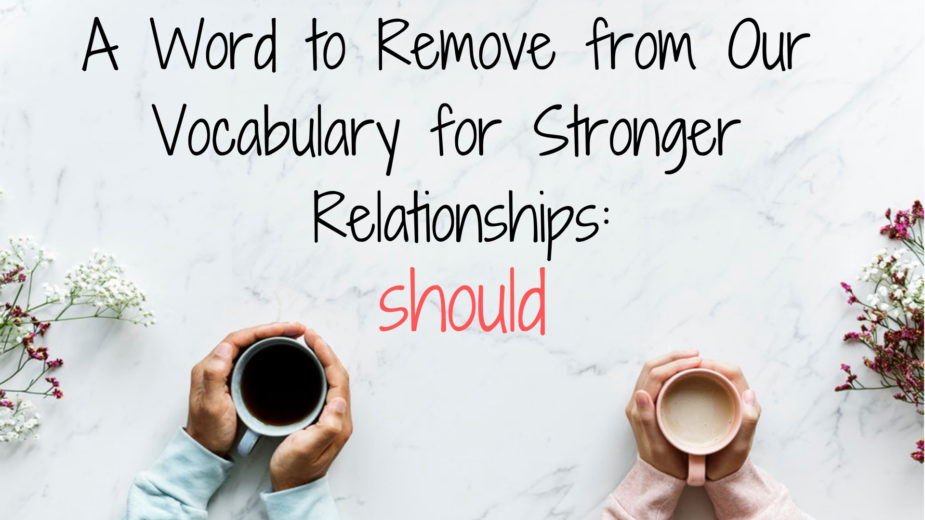 "You should read this." "You should do this." "You shouldn't be wasting your time doing . . . " Over the past couple years I have been wrestling with the uncomfortability that piques me any time a friend, family member or even complete stranger states something including the word "should" in the declaration. And after much grappling, I discovered the root of my uneasiness each time the word would be stated/written with such ease from a speaker. Rather than motivating or inspiring one to act in a particular manner, it was dictating. The strength of a civilized society is how well it effectively communicates. Defined by Livestrong, effective communication is the act "of sharing information, thoughts and feelings . . . through speaking, writing or body language to require that transmitted content [be] received and understood by someone in the way it was intended". The gift of a free society, of a democratic society, is that the people have choices of what they will or will not do. And while, arguable, yes, having what often feels like infinite choices can be numbing, inspiring us to choose either the easy route or no route at all due to paralysis, we do have a choice. Because we have choices about who we build friendships with, who we choose to share our hearts with, and how we choose to build our lives, once we recognize that letting go and refraining from telling others how to live is a pillar for stronger, healthy relationships, we no longer are cowed into being dictated to by those who know no other way to lead or direct. In our modern society, when we eliminate "should" from our vocabulary, we not only strengthen our relationships, we convey respect to others and their journey as well as our own. How? Let's take a look at benefits of letting go of the word "should" from our everyday conversations with others and ourself. When we refrain from using the word "should" (also, should not) in our vocabulary . . . 1.We exemplify our open-mindedness When we don't have expectations regarding how others "should" act, we communicate nonverbally, that there are many different ways for people to live. Simply because someone goes about life differently than we do, does not mean it is wrong. It is merely different. Ultimately, by not using the word "should", we open the door for further communication so that more understanding of both sides can be brought forth. 2. We communicate responsibility for our life journey Not only is using "should" unhelpful for our relationships with others, it is also disastrous for the relationship we have with ourself. When we tell ourselves what we "should" be doing, we are implying judgment upon our actions, as if we do not have control - when we know cognizantly we absolutely, we do have control. A better approach to this unhelpful default of how we communicate with ourselves is, as was shared on Tiny Buddha, is to remind ourselves of the benefits of the behavior we would like to practice, but is more difficult to perform. As well, by reminding ourselves of the characteristics we wish to project to the world and the values that are important to us, it becomes easier to do what we know would be best to live the life we love living. 3. We reduce destructive self-criticism In episode #122 (Why Not . . . Have Self-Compassion?), I shared in detail the benefits of reducing or eliminating self-criticism in order to improve the overall quality of our lives. After all, how we treat ourselves is how we allow others to treat us, so when we show ourselves respect, we headline to the world that we know and believe ourselves to be deserving of respect. 4. We become honest observers of our lives (emotions, actions, etc.) and navigate them healthily for positive growth Writer Hannah Braime shared honestly that when she would feel jealous or angry, she would beat herself up verbally for feeling said feelings. In actuality, she discovered that instead of ignoring them, she needed to explore them, in order to better understand herself and how she engaged with the world around her. In so doing, we learn, we become students of life, and enable real growth to occur. 5. We celebrate the vast goodness, rather than moan when our narrow and limiting expectations were not met As I shared in a recent KATU segment on the keys to contentment, the difference between having expectations (which includes using the word "should") and hope (keeping an open mind) is that we are better able to see all the awesomeness that surrounds us. The analogy I used was expectations is akin to viewing life through a peep hole (narrow), versus viewing life through a house that has floor to ceiling windows and walls - wide open. 6. We shift our outlook to being positive, rather than looking for the problems, the hiccups, the one detail that just isn't right in our minds By choosing to keep an open-mind, we see more, we come to understand there is far more goodness and awesomeness than we may have initially believed because we are not drilling down and solely focusing on that one singular behavior, outcome, etc. 7. We and others we work with and around become more productive Inspired workers, inspired people are more engaged, filled less with fear and thus have more energy to produce good work. Fear cultivates stress, stress expends energy, and that is energy that can be used for positive progress rather than gently walking a tightrope trying to figure out what we are supposed to do to avoid the wrath of our boss, our colleague, our partner, our friend, our parents, etc. 8. We begin to be inspired to work and tend to tasks that are on our to-do list, rather than doing them with dread or displeasure. Changing the way we think and speak, eliminating the "should", is a shift, and for most of us, a big shift, that will take time. But if we are only living in such a way because we think we "should", we are not living well. We want to live our everydays with purpose, but also contented engagement. Knowing why we are doing anything is a simple way to provide motivation rather than dread. When we have purpose for what we are doing, we can engage with an uplifting and happy disposition, rather than just trying to complete something in order to get it done. Writer Jack Ninivaggi points out that when we look at the word "should" as it is defined, we can better understand how destructive using it in our everyday language can be: "Verb: 1. used to indicate obligation, duty, or correctness, typically when criticizing someone's actions." Approaching a conversation that aims at seeking change is less likely to be effective when the tone is critical. As noted initially, inspiring action yields more of the results we seek more often. The words we use are powerful, and as has been discussed on the blog and podcast before, sometimes we get into defaults that are not positively enhancing our lives. Check your dialogue and how you speak to those you love - which includes yourself. Are you inspiring or dictating? If you are doing the latter, perhaps that is why some relationships have peetered out or are not as strong as you would like. And if you have embodied the former, keep up the practice as it is a habit that while seemingly insignificant, can truly life changing. ~SIMILAR POSTS/EPISODES FROM THE ARCHIVES YOU MIGHT ENJOY: ~Why Not . . . Cultivate Contentment Today? ~One Small Adjustment Away from Contentment ~Learn more about TSLL's Weekly Newsletter Petit Plaisir: ~A Simply Luxurious Holiday Playlist ~TSLL's 2018 Holiday Gift Guide ~Chocolate Almond Praline Cookies (a Petit Plaisir from #183) 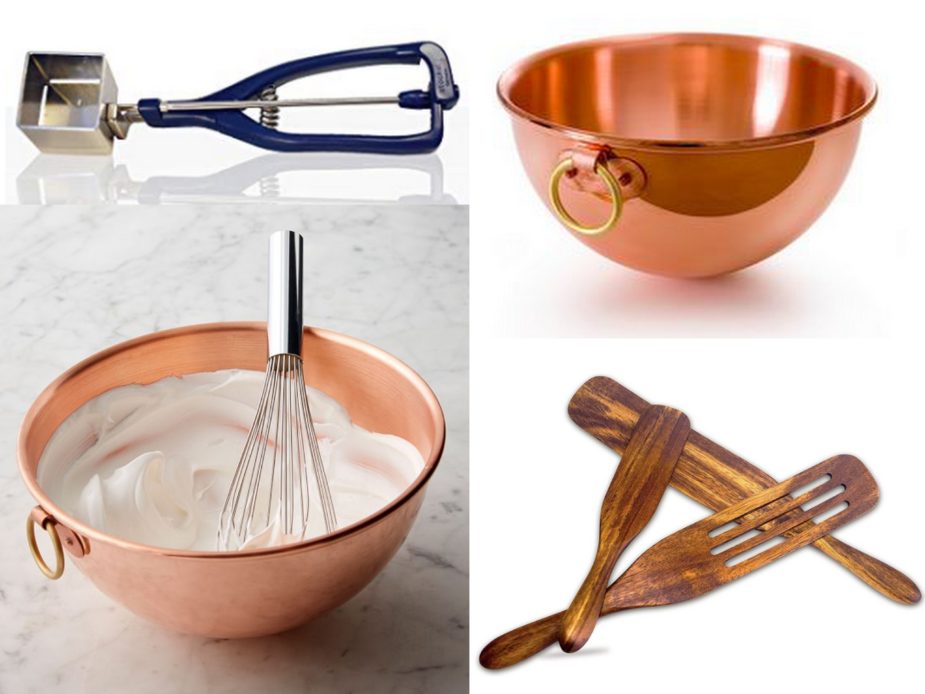 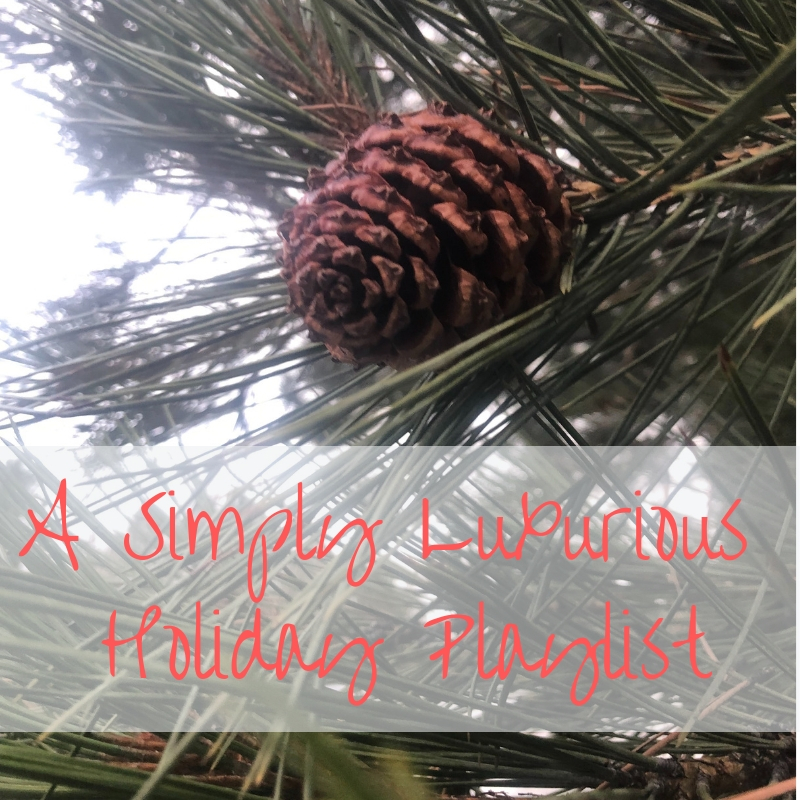 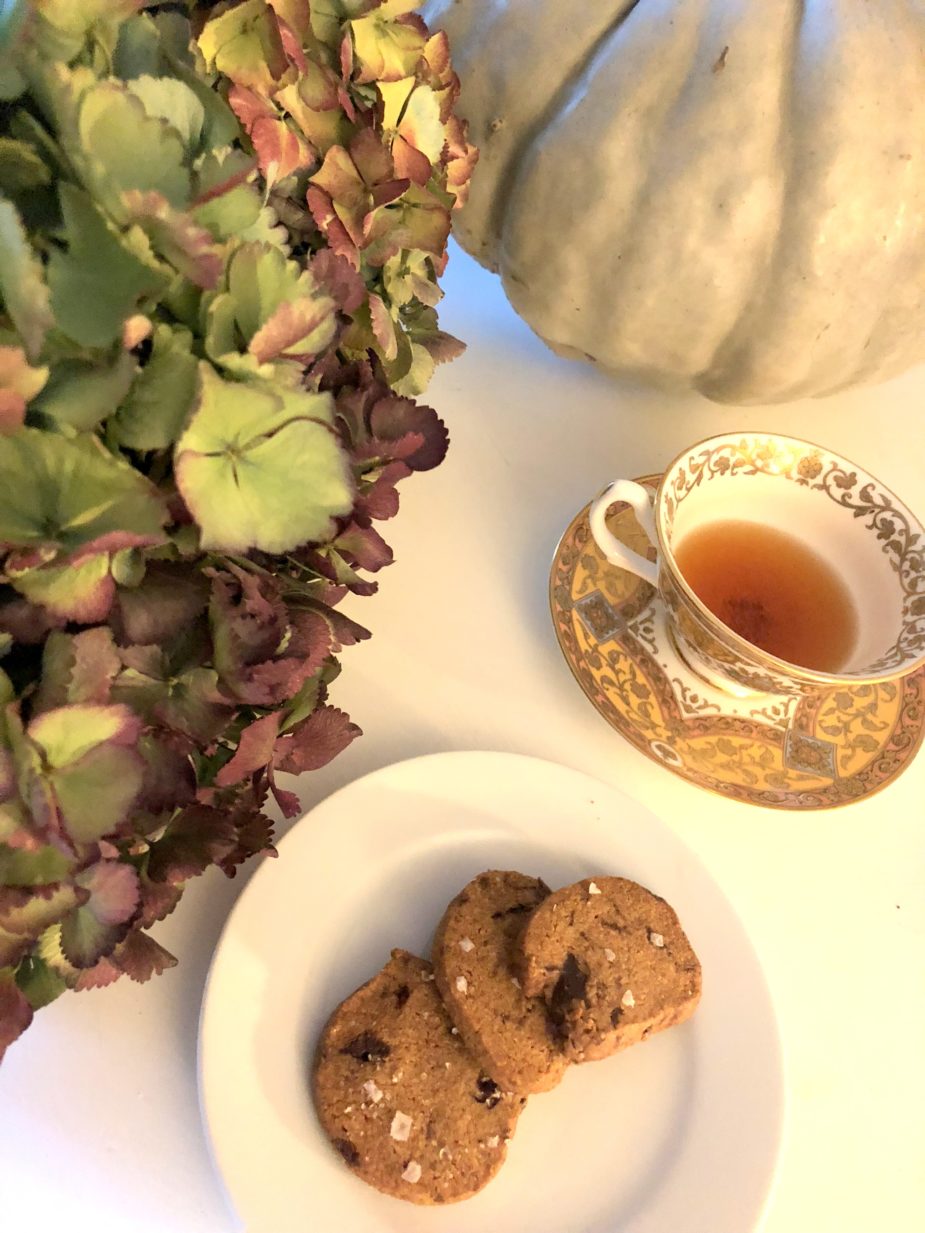
|
Mon, 5 March 2018
~The Simple Sophisticate, episode #198~Subscribe to The Simple Sophisticate: iTunes | Stitcher | iHeartRadio | YouTube
Already a staff pick at one of my favorite independent bookstores, Powell's (seen in the image above), it was a pleasure having Jenna on today's episode of the podcast, and whether you are in a relationship, looking for a relationship or have ended a relationship, her book is a researched based approach paired with personal anecdotes from men and women sprinkled along the journey of love sharing a powerful message to trust your journey. Get to know Jenna Birch:
~SIMILAR EPISODES/POSTS YOU MIGHT ENJOY: ~Choosing a Partner: Part Une —Why It's Difficult & the Essentials for Being Ready ~Choosing a Partner — Part Deux: The Importance of Knowing Yourself & the Crucial Must-Have, episode #179 ~16 Tools to Ensure You Are Ready for Real Love ~10 Differences Between Men & Boys ~7 Components to Strong, Healthy Relationships, episode #11 |
Mon, 16 October 2017
~The Simple Sophisticate, episode #179~Subscribe to The Simple Sophisticate: iTunes | Stitcher | iHeartRadio
1.The ideal everydayLiving simply luxuriously is ultimately about elevating the everyday and create the extraordinary. An extraordinary that a passerby without deeper insight may not observe, but we, the person living the life we've created savor with deep appreciation each and everyday. While it is important to understand what your dealbreakers are and what you most desire in a partner, a simple check is to "imagine the rest of the day —not special, not peak experience, just normal, solid and satisfying". Since I have a feeling many long-time readers/listeners of TSLL/podcast have constructed and curated everyday lives they love (find out how to do so here and here) already, imagine how a partnership exists within your ideal everdyday. Can you see that person (whomever it may be that you are involved with or considering dating) intertwining well with your ideal everyday? Would you interwine well into their ideal everyday? And perhaps you are still cultivating your ideal everyday, which is most likely the case, even for me. I am always striving, adjusting, improving, learning, and yes, I would love to share my everydays with a partner. So a better question to ask is "could this person help us create the daily life that we want forever?" If you are shaking your yes, even if ever-so gradually, continue to get know the person you are thinking about at this very moment. 2. The truth about chemistry"Perhaps the only thing that chemistry guarnatees is chemistry. If so, then maybe instead of demanding it as a prerequisite for a relationship, we ought to be seeing it as a distracting delusion." Sometimes you just wish you'd been given certain advice when you were young and had it tattooed on your palm to read again and again until you understood its truth. Such is the case with #3. Case in point to what I shared in the introduction, I have had dear friends tell me that "chemistry must be there . . . I don't care what anyone else says." And to be clear, we're talking a physical attraction when we say chemistry. But after nearly twenty years of dating, I want to say for the record that I know this to be false. This is not to say I haven't had good chemistry with individuals who I have been in healthy relationships, but it wasn't always the case. And case in point on the flipside, I have walked away from individuals after one or two dates because I felt no chemistry who, upon reflection, were lovely people and possessed the crucial detail I will mention below. The key with chemistry is that it isn't bad, but it shouldn't be the only thing, let alone the most important factor, when choosing a partner. Knowing what is going on within our bodies and why when chemistry occurs is important. However, it is important to note that research even finds it diffcult to "pin down what exactly chemistry is, let alone what causes it." So for us, mere humans, to say without chemistry a partnership cannot occur, is a logical fallacy. 3. Knowing our comfort levelThe debate about whether it is best to choose someone who is similar to us or to choose someone who meshes well with us or someone who is polar opposite will forever continue as each human being has a different level of comfort with similarities and differences. The key is to know your comfort level, know what you need and what you can be flexible with and be clear. In other words, knowing thyself is vital. 4. The truth about the differences between men and womenCulture has nurtured individuals within a society to ascribe with certain stereotypes regarding men and women, but the truth is, as biology has proven, "men and women are actually quite similar". The skills each of us learn as we grow up can be attributed to nurture, and thus we can change, we can adapt, we can reflect on what works for us and what does not, and if we choose, step away from from hindering behaviors and thought defaults. 5. The most important must-have"Emotional responsiveness— a partner's ability to pay loving attention to our emotional needs, and our ability to pay attention to theirs. Note the reciprocity. As well as needing to choose a partner who values our feelings, we need to choose a partner who motivates us to value theirs." No matter how compatible on paper two individuals may be. No matter how electric the chemistry, Quilliam argues that a relationship without emotional responsiveness is not a relationship you want to be in. A few weeks ago I wrote about the truth regarding compatibility, and shared a list of components that are part of being emotional responsive. The underlying detail is that we have to want to be emotionally invested, we have to want to step forward and love in a way we may have never loved before and on the flipside, we need to see and feel our partner doing the same. 6. Discuss love languages with your partnerIn Gary Chapman's best-selling book The Five Love Languages, he shares the primary five ways each of us may feel loved by someone else. Just as with any new language, it is something we have to learn about our partner. How do they feel loved? What actions, when I partake in them, communicate my deep affection for them, and which do not? I broke down these five langauges in episode #87 of the podcast, and I encourage you to take a look because as important as it is to know the love language of our partner, it is just as important to know our own love language. And to know how to communicate what we need to our partner. 7. Understand attachment tendenciesIt is human nature to have any one of the four attachment tendencies throughout the duration of our days and lives and thus with our partner as our relationship is growing. Introduced by psychologists John Bowlby and Mary Ainsworth as they studied child development, time has also revealed we carry attachment tendencies with us into adulthood as well, and it makes sense. We are looking for connection, security, love. What are the four attachment tendencies? Secure, Anxious, Avoidant, Attacking. Examine yourself and see where you fall primarily, and then examine when or if you fall into the other categories. Ask yourself, what occurs to make me feel anxious, avoidant or the need to attack? The ideal as you might have already guessed, is to feel secure and to find someone else who is also secure, which leads me to #8. 8. The ideal: Tranquility and SimplicityQuilliam pointed out that we rarely see a "secure" attachment in the dramas or comedies we view on television, read in books or see on stage. Why? As critics would say, it would be boring. No drama. To me, that sounds perfect, and it truly is what we should aspire to in order to be a good partner and what to seek in a good partner. The outcome of two individuals who are primarily secure individuals with regards to attachment (admittedly, life has its unexpected moments when we stagger and fall back into one of the other three), is a feeling of calm. And this is where some of us mistake our potential partner who makes us feel calm, as boring and not right. This would be a mistake, as Quilliam points out. Calm is secure and content. A turbulent, up and down relationship is not healthy or foundation building that will last. Seek out the calm and be the calm, and you will have a beautiful partnership. 9. The importance of self-love along with loving our partnerIn points #8, #6, #3 and #1, a primary and thus necessary component is knowledge of oneself. And along with this self-knowledge is the knowledge of how to love ourselves. How to be kind and gentle with ourselves, how to eradicate the negative voice, to refuse to let others bring us down and respect the boundaries we need in our lives. As Quilliam shares the insight from relationship psychologist David Schnarch "We need to feel 'at home' in ourselves in order to have 'a good place to invite a spouse to visit'". In other words, finding the right partner begins with understanding and then loving ourselves because when we embody love for the life we live, we are then truly able to give it sincerely to others. We may not know when we will meet the right partner or potential right partner, the good news is there are plenty opportunities to do so should we choose to live in accordance with our unique compass and temperament. Quilliam does go into great depth about how to meet potential partners that are best suited for us, and if this is interests you, I would encourage you to pick up her book. Largely, why I enjoyed the book so much was that the truth is if we have the wrong map, we'll never find what we're looking for. And her book is a simple, direct road map that is full of common sense if you are looking for a partner that you want to enjoy your everydays with and build a life together in which both individuals are respected, loved and supported. ~View Part Une (one) of this series - Choosing a Partner here. Petit Plaisir:~A Moveable Feast with Fine Cooking on PBSThe Emmy nominated food feast show which airs on PBS and is hosted by Pete Evans, Australia's top celebrity chef is in its fifth season. Currently season 5 is running on PBS, but you can view the past four seasons via Amazon Video. Click here to take a look at the previous four seasons and check your local PBS listings to see when A Moveable Feast airs in your town. ~Subscribe to Fine Cooking magazine here This episode is sponsored by:
Image via TSLL Instagram |
Mon, 14 August 2017
~The Simple Sophisticate, episode #170~Subscribe to The Simple Sophisticate: iTunes | Stitcher | iHeartRadio{As always, I encourage you to listen to the audio version as much more is talked about beyond the transcript below: more anecdotes, examples and ideas about how this episode is really about enjoying our time alone whether we are coupled or single.} Having lived on my own most of my adult life, but significantly so these past five years, without hesitation I can say, I've loved every minute. Some people scoff in disbelief, but it was this time alone (not being lonely) that enabled me to cultivate my dreams and gradually turn them into my reality. Even if you are not single at this moment, I would encourage you to listen/read this post because the more we understand any individual’s choice, the more at peace we can be with our own. Inspired by Mari Andrew's recent illustration on Instagram synchronized with the return of my partner who has been working abroad for nearly six months, I have been contemplating the single life and then the life one shares with a partner significantly more than I have in the past. In many ways, I have felt single these past 5-6 months with regards to how I go about my days; however, my heart is partially here in Bend and partially where he was temporarily working which meant my mind as well as my scheduling in order to communicate, definitely did not feel single. But as he returns home, I am grateful. Of course, most importantly grateful for his return, but as well, grateful for the time I had being single and the fact that I sincerely savored these past five years. As I mentioned in 2011 in this post, and went more in-depth in TSLL book, being single is a beautiful opportunity; not something to run from. But rather directly into, embracing every moment. In fact, in my case, I wholeheartedly agree with Elizabeth Gilbert's quote, "Avoid romantic entanglements in your youth and focus on yourself. The amount of hours of time I spent with boys and men that I could have been ... I could speak fluent Mandarin now in the amount of hours I spent . . . I wish that I had spent those youthful years just feeding this mind." It was my twenties with regards to love, which I have shared in my first book that I wish my focus, my priorities, due to societal expectation and pressure and due to my ignorance until I rid myself of that ignorance, had been on myself and my journey, which is what being single (no matter what your age) enables you to do at a much deeper and more independent level. Let's talk about the luxuries of being single and demystify the derogatory notion that being single is a stigma. This stigma has been loosening its grip a bit as fewer women (53%, 18 or older are not married) are married than those that are single in the United States according to a 2015 US Census Report. And of all people 18 or older, 45% are not married. However, the media, communities and the online dating businesses would prefer if you sought out a partner to wed. After all, there is money to be made if you feel you are missing out. You will subscribe to their services, you will purchase their products in order to enhance what we all know doesn't need enhancing (you are enough just as you are), you will fork over money for weddings. Now, I am not advocating for single life and against being married, but I am jumpstarting a conversation about where the pressure to marry is coming from. If it coming from a sincere love and affection for your partner and they for you, beautiful. Dive in. But if the pressure is coming from an external force, inflicting guilt that you wouldn't feel if society didn't apply the pressure or expectation, then step back and recognize how luxurious living single can be. Neither lifestyle is better than the other, single or coupled or married. We each make it simply luxurious based on how we structure our days, our time, our thoughts, our conversations and our priorities. But today, I want to pay homage to a lifestyle that has served me very well and a way of living that provided a haven for my dreams to materialize. 1. Fleshing out your dreamsSince I mentioned it in the introduction, I wanted to start with this benefit of being single: you figure out what you truly want. As you go about your life as a single person, you have the time to listen to yourself, focus on yourself without balancing your pursuit with another's. And upon coming to better understand yourself, you begin to navigate a journey that leads you to new experiences, new people that are more in alignment with what you value, whether they will become a future business partner, a new client or a life partner potentially. 2. A trust in yourself is strengthen beyond expectationAs Mari mentions in her illustration, I couldn't agree more. You begin to recognize how resourceful you actually are, perhaps more than you realized. Need to know how to handle a-locked-out-of-the apartment/house situation? You've done that, figured out a plan B for the next time that it happens, and brought yourself peace of mind in the process. Need to tighten your budget to save up for that dream of investing in your business? You've done that, been disciplined and found out you could live without so many dinners out. 3. Fewer heart worriesWhat I mean by this is as I have been going about my days these past months, I have been comparing how I felt this year versus last in which I was single. And one of the differences is in moments of worry that are completely out of my control, my heart aches. When you are single, your focus is on yourself, your projects, your job, perhaps more remotely your family, if you have children, they receive more of your time, your pets, and any idea that tickles your fancy. The unknowns are fewer, not entirely gone, just not matters of the heart, which we know are intense when we care for someone deeply and have made ourselves, and they to us, vulnerable with what we've shared. Put succinctly, more of your energy (because emotions are energy) is free to use as we wish. 4. Meal time is anytime you need it to beAs someone who is a very regular breakfast eater and eats the same thing, I never think twice about what I will have because I know I will always have what I need, and I need it as soon as I wake up. When it comes to dinner, I eat when I get home from school or when I am done with a project with the blog. That time shifts and changes, but when I am done, I am hungry and I eat. On the flipside, when you dine with your partner, you want to share the meal with them, so your schedules need to be flexible, patience is sometimes needed, but it is certainly worth it. 5. Bedtime and wake time are yours to chooseWhether you are a night owl or an early bird, your day ends when you say it will end and it begins when you throwback the covers. No need to worry about being quiet, or keeping the lights low or off, the house awakes (if you live alone) when you awake and the day begins. 6. Vacations happen when you are ableWith no need to check more than one schedule, when you are available and you have the funds, you can enjoy a much-needed getaway. While traveling with a partner is something I now eagerly look forward to, I also loved the flexibility of going when I needed to recharge. I would just look at my dogs and ask them if they were ready, and they always said yes (I think . . . I hope!) and we were off! 7. Change of plans can happen at the drop of a hatIf you are eager to see a movie, but at the last minute, you're not feeling up to it, no worries, just don't go. If you want to leave the party at a certain time or earlier than you expected, you don't have to check with anyone, just leave. 8. You can be as frugal or as lavish with your money as you please (within your means)Money is a funny and integral part of any chapter of our lives, but when we are single we are the sole captain as we don't share a mortgage/rent, bills, investments, etc. Some may see this as a drag as we have to foot the entire amount and not split it. But I rather like knowing and have having complete control over my money (not to say you have to relinquish this when/if you become involved). As well, being secure in your money handling skills is a very attractive quality and something to look for in a future partner as well. After all, you can choose the size and location of the house/apartment you want based on how much you want/are able to pay without agreement with anyone, you can splurge one a dress from the fall collections, but trust yourself to skimp on the money spent on an upcoming vacation. You get to make these decisions without explanation. Now there is a flipside to all of these luxuries when we find a loving partner who just walks well with us through life. Each of these positives becomes heightened in a manner that often (at least for me) I didn't expect but wholeheartedly appreciate and savor. The gift, of which there are many, of being single is that we give ourselves time to fully become fluent in the language of ourselves so that we can then be the translator in the world as we work with others. Not only does our time alone enhance the quality of our lives professionally and platonically but when we do, if we do, meet a potential partner, we are more likely to find someone who enables us to keep the luxuries of the single life that we just don't want to give up as well as reveal to us that the luxuries of being part of a couple are pretty amazing as well. From my experience, having a positive experience of living single, embracing it completely, has enhanced my appreciation for the journey I have just begun with my partner. First of all, it was a choice of desire, fondness, affection and respect rather than an act of desperation, resignation and acquiescence. And secondly, I wasn't looking for love, I was already in love with my life which is how we met, doing, seeking out what we each love about the life offered here in Bend. ~SIMILAR POSTS/EPISODES FROM THE ARCHIVES YOU MIGHT ENJOY: ~The Truths and Myths of the Independent Single Woman, episode #94 ~Why Not . . . Be a Confident Single Woman? ~Why Not . . . Live Alone for a While? ~The Audio Book is Now Available of Choosing the Simply Luxurious Life: A Modern Woman's Guide (Audible, iTunes & Amazon), learn more here ~Subscribe to the weekly TSLL newsletter here ~2017 TSLL French Week Round-Up Petit Plaisir:Newly updated with more series options and mini meditation options when you don't have a full 10 or 20 minutes to meditate but want to keep the daily practice.
~On August 4, 2017, Andy Puddicombe (the voice you hear on the Headspace app), sat down and meditated for 2 minutes with Jimmy Fallon and his audience. https://youtu.be/kP_EY7pdTJY SPONSOR of today's episode: ~To pick up a free sample box, go to KindSnacks.com/tss ~Join the Snack Club
Image: TSLL IG |
Mon, 31 July 2017
~The Simple Sophisticate, episode #166~Subscribe to The Simple Sophisticate: iTunes | Stitcher | iHeartRadio
"If you want to change your partner, change yourself." —Esther Perel, relationship psychotherapist and best-selling author~Enjoy TSLL's first book Choosing The Simply Luxurious Life: A Modern Woman's Guide in audio format on Audible, iTunes, and Amazon. The unexpected adventure you embark upon when you step into a relationship with a potential life partner is that you embark on a journey of self-discovery. Of course, we can and should go on sojourns of self-discovery before we choose to step into a relationship, but because of the nature of a romantic relationship, often our less developed and tender spots don't fully become exposed. After all, when we care for someone and see potential for spending our future with them and they with us, we experience emotions at a more intense level than we may have before and perhaps emotions we may had never experienced before. Whether you are in a relationship that has been seen years together, are just beginning to get to know one another or not in a relationship at all except the one with yourself, understand what Esther Perel reminds us all of above. If we enter into a relationship in hopes of finding someone who will fill a place in our lives, do what we need them to do and forget that a relationship involves two human beings made up of emotions, aspirations, perceived as well as real limitations, than we need to step back from stepping into a relationship in order to have a healthy relationship down the road. A simple understood truth that most people accept is nobody is perfect, but sometimes we skip over this truth and jump to assumptions and high expectations rather than coming to understand the person we are involved with and finding the strength to truthfully express who we are and our curiosities as well as our boundaries. Let's take a look at at what love, real love unveils and asks of us as well. Truths to understand1.You must become a good partner in order to have the opportunity to find and begin to grow a healthy relationship. I must first say, you do not have to have it all figured out when it comes to relationships, what improvements you need to make, etc., etc.. What I mean is that you must come into a relationship as someone who is content in their own company. Someone who is self-aware and therefore also aware of who might make a good partner. Your ability to communicate clearly, as well as be willing to be vulnerable, but also confident and assured so as not to be taken advantage of. 2. A healthy relationship which requires being involved with a secure partner, will provide the opportunity to see faults in ourselves While we are imperfect beings, the truth is when we live on our own or we live in relationships that are not truly intimate, we can refrain from confronting what is obstructing our path to reaching our fullest potential. However, when the carrot of a loving relationship is set before us, we will have moments of opportunity to recognize where can do better. In those moments, take time to reflect, and if necessary, communicate with an objective or trusting third party that will give you tools to shift or change what is no longer working. 3. From time to time we will fall back on defaults that are unhelpful However, the key is recognize these instances when they occur, and gradually with mindful attention, understanding why you do so, choosing a new action that is helpful and healthy rather than hurtful and destructive. 4. High emotional intelligence will not only help you but your partner, and visa versa Becoming someone who can accurately identify how they feel and why they feel the way they do is a step in the direction of refraining from acting unnecessarily on emotions that will soon pass or you are feeling based on past experiences and not due to what is actually and who is actually with you in the present moment. Similarly, when you can do this for yourself, you can then begin to better accurately observe those around you and while not always telling them you know what and why they're doing what they are doing, knowing when it would be helpful and when it would not be. 5. Courage & bravery are required Initially, these may be viewed as the same skill, but the repetition is necessary. We will need to be courageous to reveal who we truly are, what we actually need and be honest about where we can let go. And we will also have to be brave to open our lives up to an individual who is not as well known to us as we know ourselves. 6. It's easy to react. It's more difficult to respond. However, with thoughtful practice, responding can become your default rather than reacting. It just takes conscious effort. Learn more about the difference between reacting and responding here. What the journey will involve1.Both partners consistently choosing to figure out how to best make the relationship work and work well for both individuals involved, as well as for the relationship they want to build together. What do you want? What does your partner want? What do we want as a couple? Have these conversations, don't be shy. Talk calmly and when you're ready. Explain what makes you feel loved, explain what makes you feel anxious. Talk through it and work through it. Time is often needed as you begin to mesh and move together through life, but communication of what works for you, where you can compromise and where you cannot is the only way to best make a relationship work for both individuals in a partnership. 2. A choice to love beyond the surface Exterior appearances can be beguiling, enticing and eye-catching. However, as adults, we can appreciate beauty from afar because we recognize that the beauty we see with our eyes is not the only nor the most significant beauty one can possess. 3. Choosing to treat your partner lovingly even during frustrating times It will take a conscious choice to respond rather than react. Being aware of how we are feeling, why we are feeling and not being led around by our emotions is key to maintaining and growing stable, healthy relationships. 4. Moments of deep breaths and time on your own to work through new feelings, circumstances, conflicts, etc. Everything that isn't working out in this moment doesn't need to be solved in this moment (even though we might want it to be because of the uncertainty and anguish it is causing). When we understand our emotions, when we understand ourselves well, we will also be stronger to step away from a conversation that may be highly charged due to a variety of reasons, respectfully explain you need a walk, or some time to collect your thoughts or something to indicate, that you will not move on for good, but you need to step back for now to gain some perspective and come back with a calm and clear head. 5. Understanding that our partner is not perfect We know this logically, but when we meet and begin to build a relationship with someone, it's natural to have high hopes. The key is to have hope rather than expectation. If we default to expectations, we set traps to fall through and get caught. But if we have hope, we are remaining optimistic while being open to what may be. 6. Perspective of what is truly important There will be moments during a relationship when things don't work out as you had hoped and disappointment arises. Perhaps not because of anything either partner could control, and while it is okay to express disappointment, it is also important to put it into perspective with the entire journey you are on together. Will this matter 1 year from now? Will it matter 10 years from now? Simple questions to ask yourself to enable you to not blow small hiccups into ginormous struggles. Sharing and feeling love with another person is a journey, none of which are exactly alike. And I think keeping that fact in mind is key. Key as well is understanding that your vision of a healthy, happy relationship may be slightly or drastically different from your partners and the only way to discover this is to communicate and begin to reveal your lives together, your real selves, yes, your best selves, but knowing that we will have off days and even in those days our best selves will be different. Love asks us to look within and examine ourselves. This can be scary, but often when something is scary it is life's way of saying, look a little closer, examine what is really going on because in so doing, you will set yourself free. ~TSLL's Audio Book is Now Available: What a Worthwhile Journey Petit Plaisir:~Homemade Ricotta Mousse & Fresh BerriesToday’s sponsor of The Simple Sophisticate was Trunk. A journaling app to keep your thoughts saved recorded and a daily habit. Try it free for 30 months without having to share your buying information. If you like the app after 30 days, you can buy it when prompted. Currently available on iTunes – find it here. |
Mon, 20 March 2017
~The Simple Sophisticate, episode #147~Subscribe to The Simple Sophisticate: iTunes | Stitcher | iHeartRadio"And you, you scare people because you are whole all by yourself." —Lauren Alex HooperThe twenty-first century woman, she has been called on this blog the modern woman, is an independent woman. And while there are many different shades, rhythms and ways of living independently, there are also many similarities. And some of these similarities are misunderstood by outsiders as they expect the traditional response when it comes to the arena of love or they have a misconception that because she is independent she must not want love in the traditional sense. Today I'd like to share 10 truths about independent women and dispel any innocent assumptions that simply aren't true. Love, whether it be romantic, platonic, a love for a passion that we pursue doggedly and without apology is an electric force that provides infinite fuel for life. Love is a necessity when it comes to living a life of fulfillment, contentment and reaching our full potential. And it is the goal of reaching our full potential that is solely at the core and what drives women who are independent. Because reaching our full potential is a unique and original pursuit, what we are looking for when it comes to love, romantic love especially will also be unique, but generally, these truths need to be understood by anyone wanting to be involved, currently beginning to date or having been intimately partnered for quite some time with an independent woman. 1. The enjoyment of her own company is real, but that doesn't mean she doesn't enjoy the company of others Alone time, great amounts or small is a absolute feast for her being. She revels in it, finds immense pleasure in it and doesn't need someone else to entertain her or keep her company. When she shares she will be spending the evening by herself, she will be spending the evening by herself because she wants to and her very busy schedule has bestowed upon her an opportunity that she is ready to savor. Introvert, extrovert, it doesn't matter. 2. When she gives or expresses love or affection, it is real Why? She won't waste time with games or ego-lifting flirtations. She is secure in who she is and doesn't need to drum up interest from others to reminder her of her worth. She knows she is worthy, and more importantly, she respects the feelings of others and doesn't want to lead them on. Because an independent woman relies on herself for her income and fulfillment, she is busy, she is driven and when she welcomes the possibility of a relationship into her life, she has done so thoughtfully. 3. Asking for help is difficult, but when she says she doesn't want it, listen to her An independent woman is willing to figure out her path and then get busy completing the tasks on her own that need to be done. She doesn't reach out and wait around for help. She may pay a contractor, a plumber, an expert in the field she needs assistance from, but rarely does she ask for help from others as she assumes and respects they have busy lives of their own as she does. However, don't be afraid to offer help. The primary reason, as mentioned above, she doesn't ask is because she respects your life and your schedule. She doesn't want to add one more task to your list, just as she doesn't need one more task on hers. Lastly, if you do ask, and she says no, she means it. She's okay with honesty, in fact she demands it and therefore, she practices it as well. 4. She is self-aware and therefore, will not hold on to a relationship if she doesn't see a future or it is a fit that simply won't work Speaking of honesty, she knows what she wants to accomplish. For the most part, she knows what it will take and what she can do. She also knows at this point in her life what works and very clearly what doesn't. And if the fit isn't right, she won't beat around the bush, hanging on to see and hoping that it will iron itself out. In other words, if you are in her life, she appreciates the connection and the partnership that is unfolding and sees potential for both parties involved. 5. Reaching her full potential is always at the core of her being As mentioned above, every woman's full potential will be different. The key is to not to assume anything. Have a conversation, have many conversations. Ask the questions, don't place the stereotype crowns on her head that Hollywood perpetuates. Ask her, does she want to become President, does she want to be a mother, does she want to travel the world helping those in need, does she want to become the next Oprah, does she simply want to write books, walk her dogs and revel in the love she has with her partner? Ask her what reaching her full potential looks like. 6. Friends may be few, but they are mighty The planner is full, goals are clear and days are often long, but she sleeps well and she is excited when she wakes up in the morning, thankful for the opportunities she has in front of her. Because of her full life, the friendships she builds are strong and provide support in one way or another. Quality over quantity as the need for strength is important, the need for trust is vital and with time on short supply, she wants to give fully to those she cares about. 7. Looking for an equal partnership Any relationship will ebb and flow based on the needs of the individuals, but the partnership an independent woman is looking for is not about fulfilling traditional roles. No. It is about setting each other in the relationship free to be themselves. A knowing by one another that there is a level of respect and appreciation for whom each is as an individual and a desire to help each other attain their fullest potential, knowing that the support the relationship provides is part of the equation. Thus, investing in the relationship is crucial. 8. Drama is for television shows and the theater The independent woman, if and when she has time, may watch House of Cards, but she doesn't engage in drama. She may enjoy the reprieve and escape momentarily, but she recognizes the unnecessary burden one puts on their shoulders when they involve themselves in drama with friends, family members and at work. An independent woman seeks to be productive, honest and clear. While she knows how to negotiate, she also understands that people have feelings and keeps this in mind when working with them professionally and personally. 9. Living together isn't off the table, it simply must be with the right person As someone who has never lived with a partner, my reasons were never due to statistics (read this article from The Atlantic), but rather because I simply didn't want to live with them which is probably why the relationships didn't last. Living together is an opportunity to connect more intimately, but only when the independent woman can trust her partner will be her partner, not her roommate, not someone who will add more tasks and chores to her list. In fact, living together, just as finding a partner that meshes well with you, should be an enhancement, not a burden to the life you already enjoy living. 10. We are looking for real love Living alone is a wonderful experience, and once this truth is realized, it makes it easier to determine if you truly are interested in someone. Why? To change or tweak the life that works exceptionally well for you is a significant decision. Needless to say, the person who provoked such contemplation must be someone unlike most others you have ever met. The key to living well no matter where you find yourself in your life is to enjoy your own company, and that is something independent women do exceptionally well. And when you enjoy your own company, you are demonstrating you are secure in who you are, your strengths and while you may not applaud your weaknesses, you are aware of them and don't let them hinder your progression (in fact, you may take time to address and improve them). And because you are secure and therefore self-confident, you are better able to recognize the same characteristics in others and quickly dismiss of those who are not, and therefore would not be compatible or able to be the partner you are seeking, if your are seeking one. The funny truth is, get on with your life. Get on with pursuing your goals and reaching your full potential. Get on with living and living well. Whether you intrigue someone or not shouldn't be the goal. The goal should be internal. Julianna Margules famously shared on CBS Sunday Morning that at the age of 35 she told her mother she didn't want to get married or have kids because she loved her freedom. Epitomizing the independent woman, she lived her life and in so doing she met her husband at age 39 as she was going about living the life she loved, never with the goal in mind to meet him. Real love enters our lives in a variety of ways: through our careers, children, pets, hobbies, service, families, our partner, etc. But it should always begin with having sincere love and appreciation for ourselves. And independent woman understands this. She may struggle with who she is becoming as it is new and seems to regularly be changing as she grows and strives, but once she figures out who she is at her core, that truth doesn't change. And knowing that truth brings a comfort and a sanctuary that nobody can take away. ~SIMILAR POSTS FROM THE ARCHIVES YOU MIGHT ENJOY: ~How to Become a Woman Comfortable in Her Own Skin ~Why Not . . . Live Alone for a While? ~Why Not . . . Revel in Being a Woman? ~View all FEMININITY Posts in TSLL Archives here. Petit Plaisir:~Radishes with Baguette, Butter and Salt - click here for the recipe
Direct download: 147IndependentWomanLove_-_31917_1.41_PM.mp3
Category:relationships -- posted at: 1:00am PDT |
Mon, 2 January 2017
We are not born knowing how to love well. We learn by observing those who raise us, observing the world we are born into and by what we read, view and absorb. The catch is not all of us are watching how to love well. Some of us will have a distorted view, some of us will be limited by what we see while others will observe healthy, kind, thoughtful ways of loving. While there are many wonderful ways to express love, there are essential components, and that is what we'll be discussing today. And if as an adult you have come to discover the models you observed were not healthy, you can absolutely change and become a student again learning how to love well, and thereby enriching your life moving forward.
In this week's Petit Plaisir, a wonderful newly released book by best-selling author Will Schwalbe Books for Living.
Direct download: 13626WaysToLove2_-_1217_9.45_AM.mp3
Category:relationships -- posted at: 10:02am PDT |
Tue, 27 December 2016
~The Simple Sophisticate, episode #136~Subscribe to The Simple Sophisticate: iTunes | Stitcher | iHeartRadio
"It's never too late to learn anything for which you have a potential . . . and the limitless potential of love within each person [is] eager to be recognized, waiting to be developed, yearning to grow . . . If you want to learn to love, then you must start the process of finding out what it is, what qualities make up a loving person and how these are developed. Each person has the potential for love. But potential is never realized without work. This does not mean pain. Love, especially, is learned best in wonder, in joy, in peace, in living." —Leo Buscaglia, in Love: What Life is All About Nurture or nature. Acquired or known. A natural or skilled. There are some capabilities we each have that come more naturally to us: the ability to sing like a songbird or swim like a fish. This is not to say that practice and expert coaching won't help, but in each of these instances, there is an innate ability that advances the individuals that apply themselves to such great lengths others may not reach. On the flip-side, there are skills that anyone can learn if they choose to, and here is the good news. One of these skills is how to love. We are not born knowing how to love well. We learn by observing those who raise us, observing the world we are born into and by what we read, view and absorb. The catch is not all of us are watching how to love well. Some of us will have a distorted view, some of us will be limited by what we see while others will observe healthy, kind, thoughtful ways of loving. While there are many wonderful ways to express love, there are essential components, and that is what we'll be discussing today. And if as an adult you have come to discover the models you observed were not healthy, you can absolutely change and become a student again learning how to love well, and thereby enriching your life moving forward. Life, a well-lived and savored life, is a life asking of each of us to acquire skills to be successful. As I mentioned yesterday in the first post of 2017, often those of us who make mistakes along the way as we travel through life are not trying to make mistakes or incapable of improving. Instead, we are doing what we were taught, what we know. We are less skilled. But we can absolutely improve. Take a look at 26 ways you can learn to love well: ~A more detailed discussion is shared on today's episode of the podcast, so be sure to download and take a listen for further explanation on each point. 1.Experiment with your own life"Change and growth take place when a person has risked himself and dares to become involved with experimenting with his own life." —Herbert Otto 2. Forever be a studentOne cannot give what they do not possess. To give love you must possess love. One cannot know what they do not study. To study love you must live in love. One cannot appreciate what they do not recognize. To recognize love you must be receptive to love. One cannot have doubt about that which they wish to trust. To trust love you must be convinced of love. One cannot admit what they do not yield to. To yield to love you must be vulnerable to love. One cannot live what they do not dedicate themselves to. To dedicate yourself to love you must be forever growing in love. —Leo F. Bascaglia 3. Cultivate your own contentment"When we feed and support our own happiness, we are nourishing our ability to love." 4. Find, unearth, your true self"Be able to love, heal and accept yourself, so you can then offer these gifts to others." Many times we seek out love in order to alleviate our own suffering, and the suffering is due to a conscious or unconscious refusal to take the time to get to know ourselves. 5. Be mindfulComing to understand how to create moments of joy for yourself enables you to give that joy, thus the love, to others. 6. Be kind7. Practice loveOne must live love. Take action. 8. Stop objectifying loveLove is not a thing to possess. You already have it, love, within you, now you just need to tap into it, foster it, practice it and then live in love. 9. Build within yourself trust, self-respect and confidence10. Become a good listenerLearn your partner's "love language". "To love without knowing how to love wounds the person we love. To know how to love someone, we have to understand them" and that begins with listening well. —Thich Nhat Hanh 11. Stop labelingStop making assumptions, stop jumping to conclusions. Let go of stereotypes about cultures, groups, etc. 12. Let go of being perfect, and just be human"A base for love and the potential for growth in love is also present in each man. Love is then a process of 'building upon' what is already there. Love is never complete in any person. There is always room for growth." "If you know, accept and appreciate yourself and your uniqueness, you will permit others to do so. If you value and appreciate the discovery of yourself, you will encourage others to engage in self-discovery." 13. Be vulnerable"Man may know that only by being vulnerable can he truly offer and accept love." —Leo Buscaglia 14. Open your palm"And then, the lover, to learn and to change and to become, also needs freedom. Thoreau said a wonderful thing: 'Birds never sing in caves.' And neither do people. You've got to be free in order to learn." —Leo Buscaglia 15. Let go of expectations, but have clear boundaries16. Cease placing conditions"Others can and will only give what they are able, not what you desire they give. When you cease placing conditions on your love you have taken a giant step toward learning to love." 17. Be patient"The human seeking love will find that love is patient. The lover knows that each person can enhance [their] knowledge of love and bring them closer to themselves . . . each person will grow at their own rate, in their own manner, at their own time, by way of their unique self. Therefore, it's helpless to berate, judge, predict, demand or assume. Love must be patient. Love waits. This doesn't mean that love sits passively forever, if necessary, for the person to grow. Love is active, not passive. It is continually engaged in the process of opening new doors and windows so that fresh ideas and questions can be admitted." 18. Learn how to communicate well19. Become an expert of understanding your own emotions20. Meet your emotional as well as your physical needs"A human's basic psychological needs are these. She requires to be seen, recognized, appreciated, heard, fondled, sexually satisfied. She must be allowed the freedom to choose her own way, to grow at her own rate and to make her own mistakes, to learn. She needs to accept himself and other human beings and be accepted by them. She desires to e an 'I' as well as a 'we.' She strives to grow into the unique individual that she is." 21. Be present"Love lives in the moment." 22. Believe the world is good because it is23. Help others reach their full potential"As soon as the love relationship does not lead me to me, As soon as I, in a love relationship, do not lead the other person to themselves, this love, even if it seems to be the most secure and ecstatic attachment I have ever experienced, it is not true love." 24. Create an everyday life to savor"Another responsibility of love is to create joy. Joy is always an integral part of loving. There is joy in every act of live, no matter how menial or repetitive . . . you can make the day a chore; dull, nerve-wracking, frustrating, a waste of time. Or the same day can be taken on with energy, enthusiasm and a determination to make it one of the best days of your life, for yourself and those about you." 25. Stand in your strength"It is the weak who are cruel. Gentleness can only be expected from the strong." —Leo Rosten 26. Become love"For to be a lover will require that you continually have the subtlety of the very wise, the flexibility of the child, the sensitivity of the artist, the understanding of the philosopher, the acceptance of the saint, the tolerance of the dedicated, the knowledge of the scholar, and the fortitude of the certain." Shel Silverstein's The Missing Piece Meets the Big O, the allegory of true love" https://youtu.be/MCmZ2jrQooE ~Books mentioned in the episode: ~Love: What Life Is All About by Leo F. Buscaglia ~How to Love by Thich Nhat Hanh Petit Plaisir~Books for Living by Will Schwalbe
|
Mon, 31 October 2016
"We need to replace the Romantic template with a psychologically-mature vision of love we might call Classical, which encourages in us a range of unfamiliar but hopefully effective attitudes: - that it is normal that love and sex may not always belong together - that discussing money early on, upfront in a serious way is not a betrayal of love - that realising that we are rather flawed, and our partner is too, is of huge benefit to a couple increasing the amount of tolerance and generosity in circulation. - that we will never find everything in another person, nor they in us, not because of some unique flaw, but because of the way human nature works. - that we need to make immense and often rather artificial-sounding efforts to understand one another; that intuition can’t get us where we need to go. - that spending two hours discussing whether bathroom towels should be hung up or can be left on the floor is neither trivial nor unserious; that there is special dignity around laundry and time-keeping. All these attitudes and more belong to a new, more hopeful future for love." —Alain de Botton ~The Simple Sophisticate, episode #128As young children many of us were told of a Prince Charming and a damsel needing rescue. Perhaps we were babysat by one too many viewings of Cinderella, the Little Mermaid or Snow White, and as we grew, the bombardment of the idea that of being incomplete, incapable and reeking of subtle desperation until that one special person found the young woman in need of assistance (in modern movies consider Pretty Woman, Dirty Dancing, Jerry Macquire, The Proposal, The Holiday, the list could go on forever) continued to viewed, digested, absorbed and unconsciously accepted as "how it will all someday work out if I am to be truly happy". While indeed times and some films are trying to make a shift, think Frozen, the reality is, the myth of a soulmate continues to be peddled, sold and accepted as the one thing, if we haven't found, we need to in order to realize true contentment. The funny thing is, or should I say, the breath-of-fresh air that I hope to share with you today is actually to become your own soulmate. And what I mean by this is what I will explain below. Believe it or not, I am absolutely a romantic, but there are some things, as I have discussed before, that must be de-romanticized. The soulmate myth is one of them, and it is the primary reason your love life, and your life in general, has been hobbled. Even if you think your love life is flourishing and you believe you've found your soulmate, believe it or not, this relationship you adore and treasure can be strengthened even more by letting go of this cultural, marketing myth. Earlier this year, best-selling writer Alain de Botton published The Course of Love: A Novel which I read and shared my thoughts on here. The gift of the novel is that it walks readers through the reality of two imperfect people, not unlike many of us who are searching and learning as we love about ourselves, about our lover, about life, etc. And as it walks through years of a relationship it reveals more of the truths that movie producers don't want us to consider: the boring but necessary parts. For example, recognizing that “Love is a skill, not just an enthusiasm.” I often discuss the power of getting to know ourselves on this blog, but the dirty work of getting to know ourselves and the evidence that we have been successful is when we understand the science as well. Such as hormones and in which instances they are released and what they can do to our moods and therefore our actions; willpower - understanding its finite nature and how to conserve it as much as possible; and emotional intelligence - being able to remove ourselves from emotions that appear seemingly instinctively and having the tools to investigate why we are feeling the way we are feeling in certain scenarios in order to move past them successfully. Often we may presume that our partner needs to fill our voids, fix our hurts and protect us from the parts of the world that scare us, but the reality is when we seek this solution to our woes, it's just a bandaid covering a wound that hasn't been tended to properly. Therefore, it will never heal as well as it could. How can we heal the parts of us that seem impossible to fix? By addressing them. By doing the dirty and seemingly difficult work of understanding why certain things in our lives aren't working as we would like them to. Having trouble financially? The solution is not to find someone who makes money, but to figure out how to manage the money you do have well and begin to be the master of money and how to earn the living you seek or live within the means you already have. As Lisa Martinez pointed out last year in an article for Verily, "invest more of [your] time in becoming a better version of [yourself]". Why? Investing time in winnowing away the aspects that are no longer serving you, coming to better understand how to handle your emotions, recognizing barriers you have in your life and then discovering the tools to work around them, as well as learning how to effectively communicate with others is a gift not only to anyone who you are in a relationship with, but a gift to yourself as well. Once you invest in yourself, you will find you enjoy your own company. You will no longer need to fill your life with appointments, responsibilities that don't support the life you wish you live, and anything to busy yourself so that you don't have to sit quietly with yourself from time to time. You will bring yourself a peace that multiplies your comfort, contentment and therefore your happiness. And who doesn't want to be around someone who is at peace with themselves and doesn't project or throw their pain onto others? The person you need in your life is your best self, and that self is in many ways your soulmate. But why not get rid of the word all together? As Alain de Botton points out "Our strongest cultural voices have - to our huge cost - set us up with the wrong expectations." Love is a very good thing to welcome into our lives, but it has become distorted in part because of the expectation we have brought into our vocabulary with the term soulmate. And it is up to each of us to recognize the perversion of love that is portrayed in media and the culture of which we are part of and come to understand what a loving relationship truly is while removing the need to label the person we would like to welcome into our lives, into the most intimate part of our lives, our soulmate. Because the truth of the matter is there is no truth to the existence of a soulmate. Yes, the dictionary defines it as the a person ideally suited to another as a close friend or romantic partner, but do you know how words come to be Webster's Dictionary? Consider the word "selfie" which was just added to the Oxford dictionary in 2014 and Webster's in 2013. Words are added to the dictionary as the culture begins using it as a common colloquialism, and therefore, a need arises to define it for the broad populous. The term "soulmate" purports to assume that we are one half of a whole as it originated from the ancient tale of Aristophanes involving two-headed hermaphroditic giants who were cleaved apart by a jealous Zeus, fated thereafter to forever seek their other halves. But here's the part where we need to pause, take a deep breath and think rationally. Growth is a choice. And some of us will continue to choose to grow and learn and progress, while some will embark on some growth and still others will be quite content to remain stagnant (ironically, even by staying stagnant, we are changing, just not in a beneficial manner). The soulmate theory is fallacious because it presumes we are fixed entities, never-changing and always remaining the same and as well the other half that we seek will be stagnant too, never having changed since being born. As discussed here in Psychology Today, "growing apart" in marriages is a common reason for a union's dissolution. Humans are, just as the world is, forever changing, learning new information about themselves and the world and choosing different ways to move forward through life. It doesn't mean that a relationship cannot endure, it just means awareness of this life truth is crucial, and to return to Alain de Botton's words "love is a skill". The story of a relationship, when the two individuals meet, connect and seem to speak the same language, is only the first chapter. The rest of the story is a conscious choice to invest, learn, listen, communicate, to express kindness and recognize within ourselves the truth behind what we feel when something new arises. The term soulmates limits us, confines us and keeps our feet in cement deterring a relationship from truly flourishing. Yes, it requires the two involved to be present, attentive and brave, but much like choosing to make the most out of our one and only life and reach our fullest potential, the path to a relationship's fullest potential is one with two people who are aware of the truth and open to learning, listening and finding strength to do what is best for both themselves and the person they are in a relationship with. So, the word soulmates? Let it go and liberate yourself whether you are in a relationship or not, seeking a relationship or not, because when you do, you open the door to yes, more responsibility on your part, but as they (albeit in reverse), when you take on the great responsibilities, you give yourself so much more power in living the life that will bring you true contentment. ~SIMILAR POSTS from the Archives you might enjoy: ~Why Not . . . Stop the Pursuit? ~The Prerequisite for a Healthy Relationship ~The Important Ingredient in a Healthy Romance Petit Plaisir:~In the Company of Women: Inspiration and Advice from over 100 Makers, Artists, and Entrepreneurs by Grace Bonney ~blog Design*Sponge ~Listen to Grace Bonney with Garance Doré on the Pardon my French podcast here
|
Mon, 29 February 2016
The importance of a healthy social well-being involves three primary components: the relationships we have with ourselves, our community and friends as well as our significant other, but how do we go about building one that works for us? That is precisely what we will discuss in this week's episode. In this week's Petit Plaisir, a new podcast to add to your weekly listening! Pardon My French from Garance Doré. |
Mon, 15 February 2016
Often while it can be easy to see the weaknesses or strengths in others' relationships, it can be hard when we're in the middle of them. As a way to develop an intuition about red flags we should heed, tune in to today's podcast to discover 18 red flags that you should take notice of and not ignore. In this week's Petit Plaisir, a simple, classic French lunch that took me back to my summer of studying abroad in Angers, France. |
Mon, 8 February 2016
Inspired by Gary Chapman's #1 New York Times best-selling book The 5 Love Languages, discover how to effectively communicate your love for you partner to them, but as well, understand how to know if whom you are with is someone destined to be your life partner. In other words determine if you are merely "in love" but not experiencing real love. This week's Petit Plaisir, TSLL App is now available for Android users! Discover all of the new enhancements and capabilities on The Simply Luxurious Life app that has been available to iTunes users for some time, but now is available for free on Google Play as well. |
Mon, 14 December 2015
What is the purpose of the first date in the first place? Contrary to what we may lead ourselves to believe, it is not to impress but rather to go on a fact-finding mission of sorts. A pursuit of compatibility. Now if who we are authentically impresses the other, splendid! But if it does not, we have not lost but an evening of our time. In today's episode Shannon shares 8 simple tasks to tend to and be aware of when it comes to preparing and partaking in a first date. In this week's Petit Plaisir, a new holiday film to enjoy - Love the Coopers. |
Mon, 17 August 2015
Even when we can identify a toxic person a mile away, we will still will have to deal with them from time to time. Whether it's in the workplace, at home or out in the community, there will be moments that can either leave us deflated if we don't know how to handle them or conversely simply be a minor road bump when handled effectively. While we can limit our interactions, we'll talk about how to do just that as well as how to deal with toxic people we may encounter from time to time. In this week's Petit Plaisir, a simple touch you can bring to your home to brighten the mood of the space without breaking the bank. |
Sun, 2 November 2014
One of the pillars of living a simply luxurious life is building strong and healthy relationships. Whether at work, at home or in your community, these seven components will give you specific guidance on how to cultivate relationships that while requiring sincere investment will produce amazing life fulfilling rewards and memories. |
The Simple Sophisticate - Intelligent Living Paired with Signature Style (relationships)

Categories
lifestylemoney
fashion
general
food
relationships
beauty
holidays
style
decor
etiquette
technology
dating
clothing
news
happiness
health
finances
self-help
feminism
french living
communication
inspiration
self-improvement
cooking
French-inspired
podcast
travel
entertaining
Archives
AprilMarch
February
January
December
November
October
September
August
July
June
May
April
March
February
January
December
November
October
September
August
July
June
May
April
March
February
January
December
November
October
September
August
June
May
April
March
February
January
December
November
October
September
August
July
June
May
April
March
February
January
December
November
October
September
August
July
June
May
March
February
January
December
November
October
September
August
July
June
May
April
March
February
January
December
November
October
September
August
July
June
May
April
March
February
January
December
November
October
September
August
July
June
May
April
March
February
January
December
November
October
September
August
July
June
May
April
March
February
January
December
November
October
September
August
| S | M | T | W | T | F | S |
|---|---|---|---|---|---|---|
| 1 | 2 | 3 | 4 | 5 | 6 | |
| 7 | 8 | 9 | 10 | 11 | 12 | 13 |
| 14 | 15 | 16 | 17 | 18 | 19 | 20 |
| 21 | 22 | 23 | 24 | 25 | 26 | 27 |
| 28 | 29 | 30 | ||||
Syndication




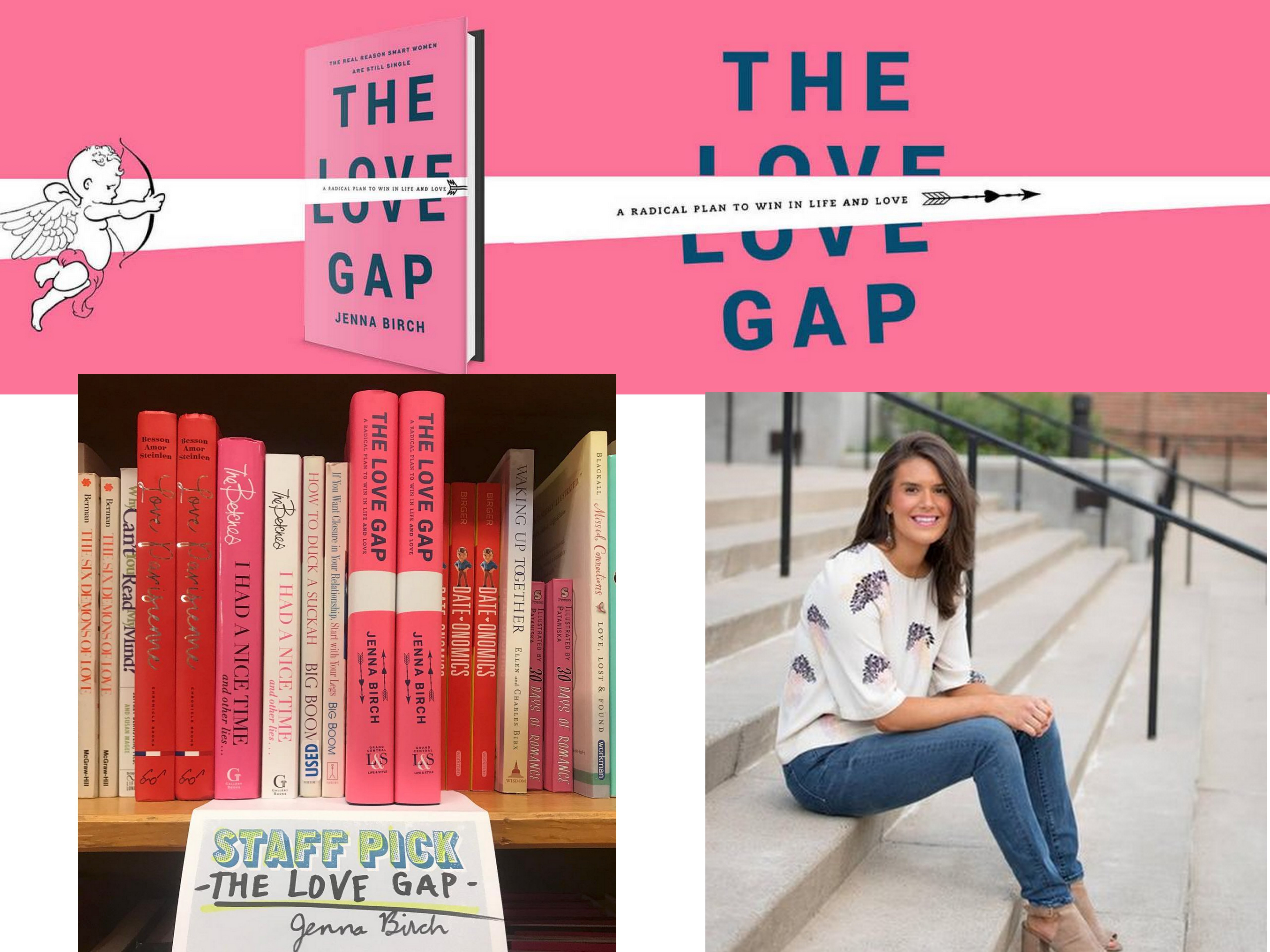 In today's episode of the podcast, author Jenna Birch stops by to talk about her new book
In today's episode of the podcast, author Jenna Birch stops by to talk about her new book 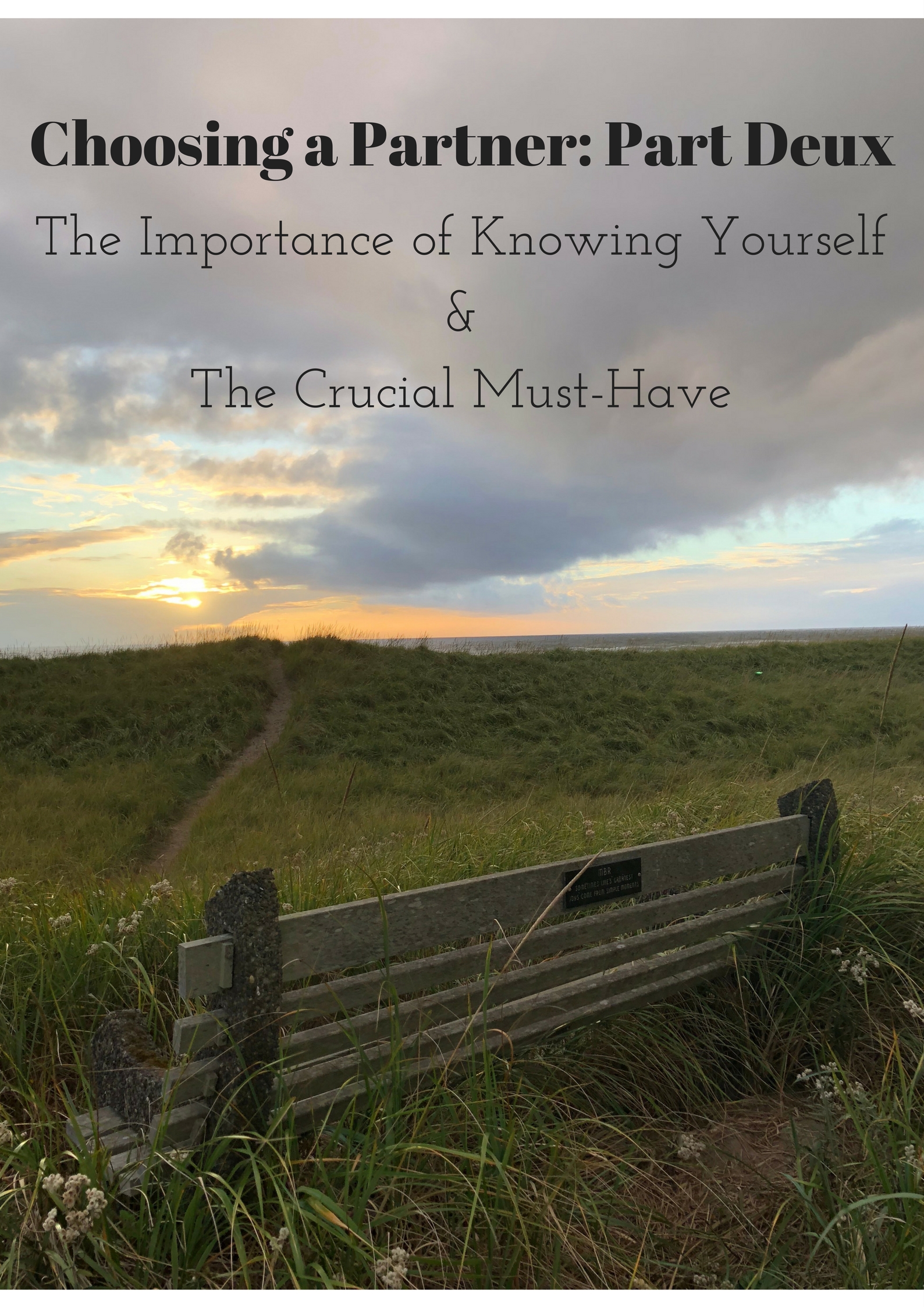 The desire to share our lives with a partner can be a different vision in each of our minds, but at the core of a strong, healthy, worthwhile relationship is something that is often dismissed as important, but not vital. Too often we are looking in the wrong place, seeking out the wrong traits and even presenting a false self in order to be chosen or to choose a person to potentially be our partner. With the inspiration of Susan Quilliam's book
The desire to share our lives with a partner can be a different vision in each of our minds, but at the core of a strong, healthy, worthwhile relationship is something that is often dismissed as important, but not vital. Too often we are looking in the wrong place, seeking out the wrong traits and even presenting a false self in order to be chosen or to choose a person to potentially be our partner. With the inspiration of Susan Quilliam's book 